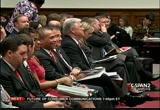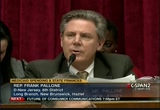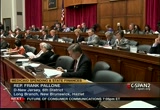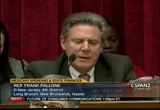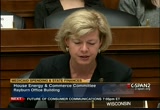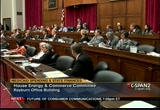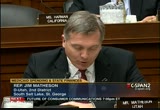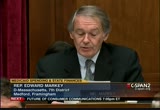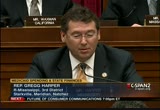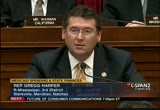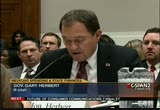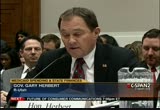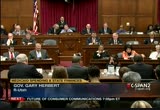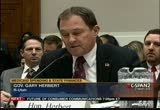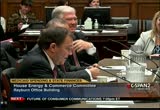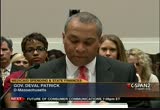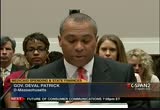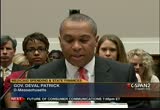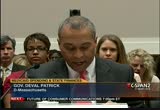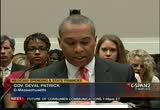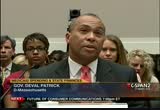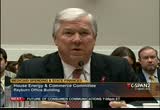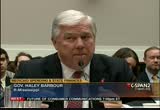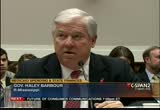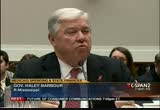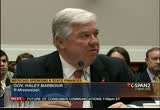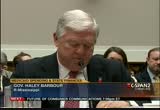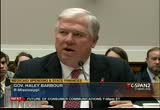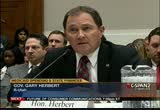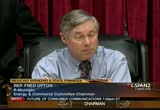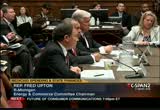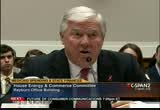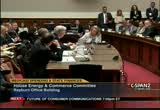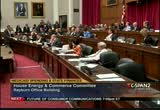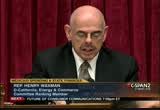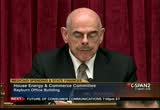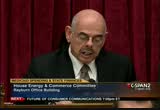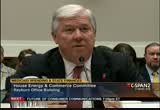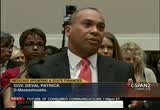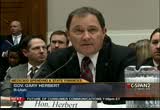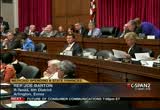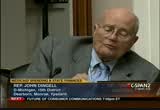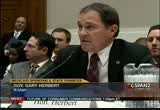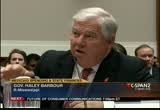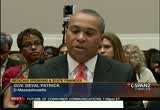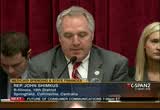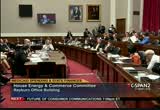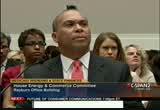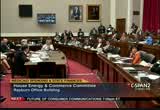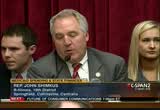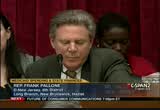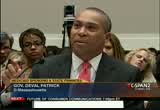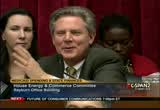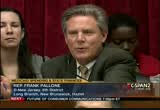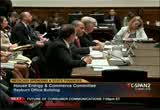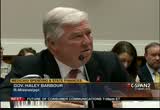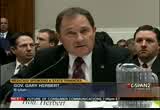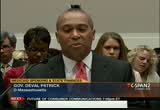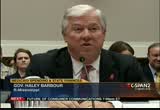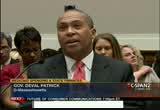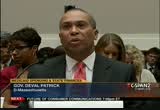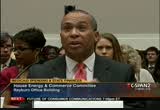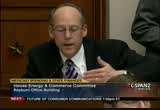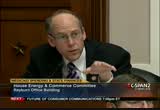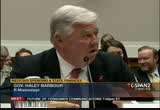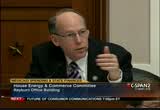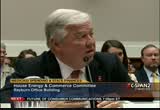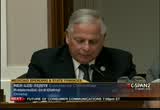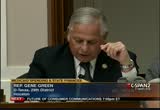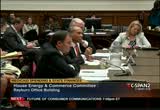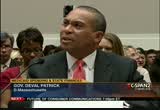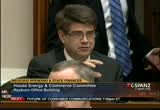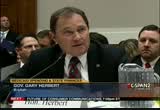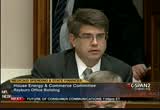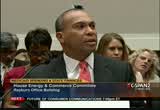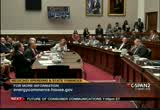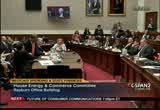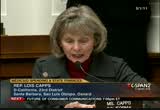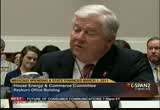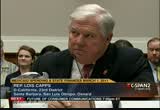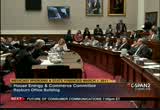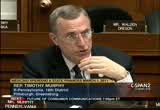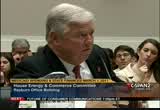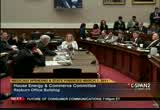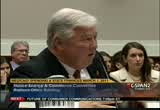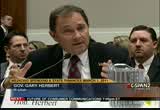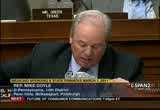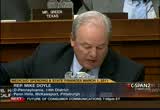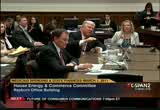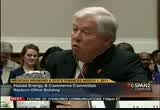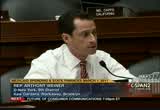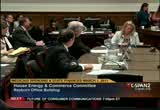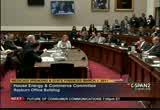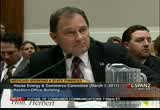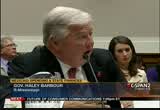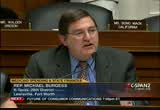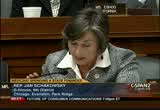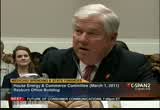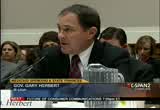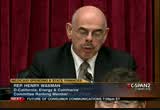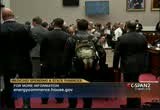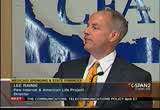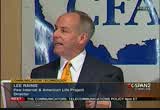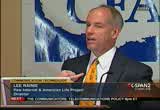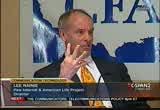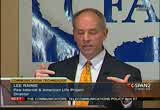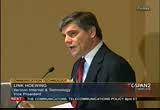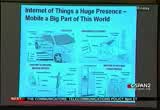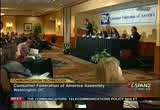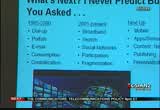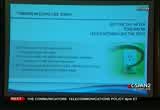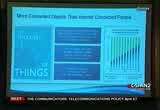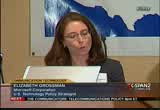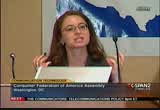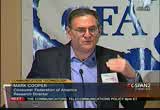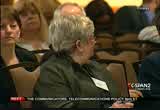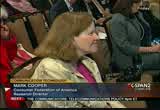tv U.S. Senate CSPAN March 21, 2011 5:00pm-8:00pm EDT
5:00 pm
care act and the many positive benefits it offers americans nationwide. the specific focus on medicaid has little to do with the newly enacted health reform, it's simply an extension of republicans decade long interest in undermining and dismantling the medicaid program. the previous congress understand the dire straits, to ensure our safety net programs would operate as they were designed to, to provide medicaid coverage for vulnerable americans as they need it most. this certainly should be contracted with the recently passed republican continuing resolution which achieving nearly 1/3 of its budgetary spending cuts by reducing critical aid for state and local governments. it's no surprise to anyone that the medicaid roles are expanding right now when the economy is
5:01 pm
contracting, medicaid often expands. in times of challenge, unemployment increases, and fewer people receive health insurance and more individuals meet the eligibility requirements for medicaid coverage. we've been hearing a lot about the need for for flexibility. states have broad latitude to design the programs after meeting minimum health care benchmark. you may apply for the section 1115 medicaid waivers to amendment further. it seems more directed at destroying the medicaid program than strengthening it. medicaid is no panacea. it would threaten the medicaid program and expand and contract according to needs. by changing the federal component of medicaid from the fixed percentage to a fixed dollar amount, states would be left holding the bag with many higher bills and times of economic crisis. it could be truly catastrophic
5:02 pm
for states that require the assistance. we should be aware of the proposals to raise cost sharing and working families in medicaid. numerous studies, included one conducted by rand health, lead to a much larger reduction in the use of medical care, and seriously compromise access to needed health care. there are a lot more thoughtful ways to harness the cost of medicaid than what the colleges are proposing. it reflects the common sense of philosophy among individuals of federal and state government. the medicaid maintenance is the state's responsibility in the near term until full health reform is reached in 2014. after that, 100% of the cost of medicaid expansion included in health reform will be born by the federal government and phased down to 90% in 2020. furthermore, the aca costs state
5:03 pm
to the federal government, and institutes delivery system reform, and finance the state efforts to establish medical homes in medicaid which will improve care for those with substantial health need. we give the states important tools to fight fraud in the medicare and medicaid. we need to think about the profound devastation some of the republicans proposals would have on working families and the state health agencies that serve them. i've been here for a long time. it's almost every year we see another proposal to dismantle medicaid. they don't like medicaid, i know that. medicaid has been a much needed lifeline for the six million people, many of whom did lose employer health insurance. i a minute left, i'd like to
5:04 pm
yield to mrs. baldwin. >> thank you. right now across the country and particularly in wisconsin, we are seeing the effect of our attacks by the nation's governors on the values that we hold dear. i'm sorry that scott walker declined the majority invitation to be on the parent today. governor walker's bill would not only strip away workers rights and gut the medicaid program. it violates the tradition of comprehensive coverage for our citizens by eliminating insurance coverage for 63,000 parents and 6800 adults and reducing coverage for current and future enrollees. his plan is also fiscally irresponsible. he's offered under the guys of repairing the state budget and saving money, the proposed medicaid provision would not
5:05 pm
yield any savings this year. instead, the plan would put the state at risk in losing billions of dollars of medicaid funding at a time when it can least afford to lose. i stand with my fellow wisconsinites who have taken to streets for the health and safety of people of our great state. i yield back. >> gentleman -- gentlelady's time has expired. it's my understanding that the policy committee has approved donna christianson to be back. without objection, i'll now recognize the following gentleman for one minute each to introduce the governors. mr. matteson, mr. markey, and mr. harper. mr. matteson? >> thank you, chairman, for holding the hearing today.
5:06 pm
i want to extent the today. i'm sorry, is the microphone on? hello. i want to extent a thank you to my governor, governor herbert, for reforming the health care system. as many on the committee, utah is one the few states that took the enactment before to tackle reforms to our health care system at the state level. one in particular with the establishment of a health insurance exchange in utah. our state's experience testifies that the flexibility that states needs. i appreciate governor herbert's participation, i want to extent a warm welcome, i yield back. >> thank you, it's my pleasure to welcome governor deval patrick here to washington. in 2006, massachusetts trail blazed the path for the health care reform we see here on capitol hill just a few year's year. our outstanding governor has been the driving force behind successful implementation of the
5:07 pm
massachusetts law. in november of 2010, he was overwhelmingly reelected to a second term. under his watch and astounding 98% of massachusetts residences, and 99.8% of our children now have good dependable health insurance. no other state comes close. just recently, governor patrick proposed new legislation to lower without cutting into the residents quality of health care or access to services. his legislation focuses on quality of health care services over quantity, encouraging providers to better coordinate care, this means lower cost and healthier patient. our experience in massachusetts shows far from being one size fits off, health care provides states with wide latitude. i can't think of a better person than governor patrick to join us, to highlight the great work
5:08 pm
we've done in massachusetts and i look forward to the testimony. it is our honor to have you with us here in morning, governor. >> i'm honored to introduce one of today's witnesses, governor haley barbour of mississippi who has made the tough decisions in mississippi to make sure we have a balanced budget, money in the bank, and has been a true leader on energy issues in the country. he has promoted a healthier mississippi, by promoting let's go walking, mississippi, and discussed in schools to show kids the importance of exercise and healthy meals. governor barbour has worked to protect the solvency of mississippi's medicaid program by controlling cost. under his leadership, medicaid changed it's prescription drug program to better utilize generic drugs instead of brand name drugs, and promoted physicals to check for health problems early by checking for
5:09 pm
diagnosis and high blood pressure. but to truly understand, look no further than what happened in the aftermath of hurricane katrina to see what his leadership and first lady marsha barbour did. they didn't wait around. governor barbour didn't wait for somebody to come help him. he didn't wait for others. he didn't sit around and complain. he simply rolled his sleeves up and went to work and the rest of america got to see what it takes to be a great leader. governor barbour, we are honored to have you today. >> thank you. governors, welcome. if you take your seat at the table. we will -- we appreciate submitting your testimony in advance. at this point, we'll recognize each of you for five minutes each and begin with governor herbert from utah. welcome. >> thank you very much good
5:10 pm
morning. i'm gary herbert, governor of the state of utah, i would like to thank congressman for your invitation to testify. let me begin by stating you are a firm believer in the principals of the 10th amendment. a balance of power between the state and federal government is not only right and proper, but essential to finding solutions to the complex problems that we face today. louis brandice described states that participate in novel and experience without risk to the rest of the country. unquote. in utah we began the health system reform efforts five years ago long before the patient and affordable care act. the health care can serve as a guide to other states as they begin their own reform efforts. the federal government has taken the opposite approach with a one-size-fits-all decree. the people responsible for the
5:11 pm
decree were never invited to the table to give our input, or ask for opinions when the act was debated in congress. i find that frankly unconscionable. the states can and should find their own solutions, tailored to the unique circumstances. a majority of utah's uninsured population is employed. they do not offer health insurance benefits. utah also has the youngest population. many of the uninsured are the young immortals that deem it to be unnecessary or too expensive. in order for health system reform to be effective, we had to respond to the needs of our small businesses and their employees. as part of our health system, utah small businesses have the option of useing a defined contribution. this allow employers to manage. with the creation of the utah health exchange, utah employees also benefit from expanded access, choice, and control over
5:12 pm
the health care options. employees can now purchase more than 100 plans currently offered through the exchange. our figured show that 20% of businesses participate in health exchange are offering health benefits for the first time. just as henry ford offering the first customer of choice of any color of car they wanted, as long as they chose black, they allow states flexibility, as long as they do it the way washington tells them. another challenge for utah is the increasing financial obligation for medicaid. even before the affordable care act, it was part of the state budget. in 1990s, it took 19% of the fund, by fiscal year 2020, it's estimated to exceed 30% of my general fund budget, without the expansion of the affordable care act. i've come to washington to present solutions to help ease
5:13 pm
the burden. first i call upon the administration to support the expedited repeal for health care. states cannot be left with uncertainty to the regards of this act. second, i ask congress to give states flexibility to find health care solutions based on each state's unique needs. and third, we have also proposed specific solutions for reform. these reforms will require that the center for medicare and medicaid services support our waiver request. in the interest of time, i have included details of the recommendation in my submitted testimony. but i'll highlight just one example here today. in our efforts to be more innovative and efficient, we develop an approach which uses paperless technology, reducing cost by the state of utah as much as 6.3 million a year. with this flexibility and this one area alone, we estimate that all of the states adopting this technology can save between 600 million and $1 billion per year.
5:14 pm
communicating by e-mail seems like a no brainer. however, we waited for eight months to hear. when we did hear something, it was denial. and in bitter irony, the denial came by e-mail. interesting when i raised the issue with president obama just yesterday, i later received this note from secretary sebeilus letting me know we could know in fact proceed with the paperless process. well, i appreciate this positive response. and i do. i have to ask myself two questions, first, why did it take a personal conversation between a governor and a president of the united states to resolve this simple issue? and second, and even more important, why do we even have to ask for permission to make this logical, cost-saving improvement? for me the situation illustrated what is wrong with the current partnership between the states and federal government. a partnership that is one sided and puts the state in a role. in conclusion, i emphasize again
5:15 pm
that real health care reform i believe will rise from the states, the laboratories of democracy, not from the one-size-fits-all approach from the federal government. from the days of our pioneer forefathers, they have been finding solutions to the problems. i am here today to support our right and responsibility to do so. >> thank you. governor patrick. >> thank you very much, mr. chairman. mr. chairman, mr. waxman, thank you for being here. thank you for the generous introduction. i look forward to discussing the affordable health care act and the next steps in implementing the national health care reform. thank you, in advance, mr. chairman, about my understanding to leave my 11:30 to catch a plane to get back home. i will submit for the record a
5:16 pm
written testimony that we have provided and offer a shorter state now. as many of you know, the affordable care act enacted last year is modeled in many respects on our own reform measure in massachusetts, enacted if 2006. our experience with our own reform in massachusetts may forecast what other states may expect from national health care reform in a couple of respects. today, thanks to effective implementation of our 2006 reform legislation, more than 98% of massachusetts residents have health care coverage today, including 99.8% of our children, as the congressman said, we need the nation in both categories. more people are getting preventive care, instead of waiting until they have to go to the emergency room. workers and their families no longer have to worry about a catastrophic illness forces them into bankruptcy or being denied coverage because they are already sick. we have not have the problem of crowdout, where companies have
5:17 pm
abandoned the plans for the employees, in favor of the publicly subsidized plans. in fact, the consent of private companies has increased from 70% to 76% today. we paid for expanded coverage just as we said we would by delivering more care in primary care than in emergency rooms. in 2005, massachusetts paid over $700 million for un and under insured. with 98% covered, it has increased state spending by 1% of our total state budget. overall, medicaid represents 32% of the annual state spending today and has grown about 2.7% per capita since our reforms were enacted. ours is a hybrid solution. like the affordable care act, it emphasized private insurance
5:18 pm
purchased in the open market at competitive prices and service delivered by private clinicians. people choose their own doctors. we still have challenges, of course. for example, even with the highest per capita ratio of primary care physicians to residents in the country, there are not enough primary care physicians. the wide variance in the reimbursement rates is another challenge. these are challenges all over the country. the point is that in massachusetts, we stop limiting our thinking to the same old two choices between a perfect solution or no solution at all. we chose to try something and we moved. and it has worked. the process of developing our reform measure is something i'm proud of too. i just want to touch on very briefly. then governor mitt romney, a republican, working together with democratic united states legislature and senator, ted kennedy, and a broad coalition of business, health care leaders, patient advocates came
5:19 pm
together to invent, and then stuck together to adjust it as we've gone along and to refine it. that bill was an expression of shared values and belief that health care is a good and everyone in massachusetts deserves access. from massachusetts, the affordable care act is familiar. like our law, it improves health security for all of our citizens, and takes the hybrid approach that leverages of best of government, and with president obama's leadership it was developed and supported by a broad coalition of stakeholders and advocates that understood that our public health demand action. affordable care act is also cost effective. according to the congressional budget office, it will reduce by $24 billion by 2019, and more than $1 trillion in the subsequent decade. national health reform is an
5:20 pm
important piece of the responsible plan to groove our fiscal outlook for the long term. based on our experience at home, national health reform is also good for our economic competitiveness. matt, the ceo of a town outside of boston, bought health insurance through a program created by the commonwealth connector which is our version of a health exchange. the program is an online service to help small businesses easily shop for private health care and find the best possible value. using business express, matt was able to compare health plans side by side and avoid a 23% premium increase his current insurer was proposing. he and his employees saved $903 -- $9,003. that is huge to a small business owner.
5:21 pm
i hope i am not upsetting anyone from florida in in in saying th. in other words, universal coverage has helped our competitive. federal reform, i see my time is up. let me just wrap up and i hope we can get to what i feel is the nub of the issue. which is cost control. and cost control is a challenge all over the country in places that have a universal system and in those that don't. 130% premium increases over the last decade. we have some strategies that we have put in place and that we are pursuing in massachusetts to get at that nationwide issue and frankly there's elements of affordable care act that help us. i look forward to your question. thank you, mr. chairman. >> thank you, governor barbour, welcome. >> mr. chairman and members of the committee, first of all, thank you for asking. the first thing that we want to say is thank you. when they were doing the
5:22 pm
affordable care act, there was a big meeting at the white house of members of congress from both parties and no governors. so thank you to the committee for both republicans and democrats for asking governors what we think. i would like to associate myself with governor herbert's request that the cases from florida and virginia on the constitutionality of the federal act be expedited. it's in our interest to know the answer sooner rather than later. and the thing we hear the most is conflicting opinions from different circuits. we've already seen conflicting opinions at the district court level, conflicting opinions from different circuits that would just compound the problem. so for those of how have any influence on that, we would like to get that question answered sooner rather than later. i'm delighted to be a friend,
5:23 pm
mr. patrick. massachusetts has a health care they are happy with. we think that's their right. and when senator kennedy and governor romney and then governor patrick, if that's what massachusetts wants, we are happy for them. we don't want that. that's not good for us. we don't want that. we don't want community rating and extremely high mandatory benefits packages. so the point i'm trying to make is different states have different problems, we have different issues, and while you may not believe it, some politicians who obviously act like you love our constituents more than we do. believe it or not, we love our constituents as much as you do. we want to do right for them. we want to do what we can afford and sustain. medicaid is a second biggest item in my budget after education.
5:24 pm
we spent about 63% of state budget on education and medicaid is the next biggest thing. however, medicaid's growth before i was governor it was growing at 16.5% a year, and we were cutting our community colleges and doesn'ting our universities because of the money that was having to be diverted to medicaid. and in my seven years as governor, we've reduced medicaid spendture of growth 4%. we have not changed eligibility with one exception, the people who we used to give pharmaceuticals through the medicaid program who are eligible now get their pharmaceuticals from part d. i want to say that. the reason that i do is because of this, we have the flexibility and reduced our pharmaceuticals program cost from $697 million to $279 million, a 60%
5:25 pm
reduction. a little bit of that came from part d. but primarily by going to generics. we are 78% generic now. and our -- the meds are great for people. if somebody cannot -- doctor, if they have to have brand name, we do that. flexibility to do that kind of stuff is critical for us. that's what we need. one the things we were allowed to do, my first year is our medicaid role went from 510 to 750,000 in four years. forgive me for thinking maybe that wasn't the way it should have been. so we found out that the previous administration had not followed the federal rule that you have to require people to reestablish their eligibility annually. they weren't doing that. we require our beneficiaries to reestablish their eligibility annually in person. and a lot of people who probably
5:26 pm
had once been eligible for medicaid but weren't anymore didn't come to try to requalify. we make exceptions for people in nursing homes for disabled children, people who are home bound because they are sick. but this is a benefit on average that's worth somewhere between 6 or $7,000. we don't think it's a burden once a year to go to one of about 70 places just to reestablish your eligibility for this program. we do that for everybody. what we would like is the ability while they are there to mandate that they take a physical. we offer at this meeting, every mississippi medicaid beneficiary a health assessment. hardly any of them take us up. we would like to be allowed, and we don't think we ought to have to ask for permission to make it mandatory. but there are a lot of things that you have to get permission
5:27 pm
to do. waivers are a problem that you'll hear from many people. i want to tell you that state plan amendments can be just as big of a problem. we have a state plan amendment where they met the 180 day requirement to improve the state plan, then it took them a year to improve the contract that was going to be part of the state plan amendment. and that doesn't help. let me just make one other point about this. i know my time is up. i think it's important. we have $7 million in medicaid that comes from fines paid by the nursing homes that had some violation. we have to get cms's permission to spend that. we ask for permission to spend it to build the facility from the 20 to 25 very sick children, typically vent patients that right now we'd have to put in the hospital, very expensive
5:28 pm
care, or send them out of state because the regular nursing homes are really not set up to have 79 senior citizens and one five-year-old. we were told where you can do that if you remodel an existing building, but you can't do it if you build a new building on our university medical center state hospital campus. those kinds of things should not -- we should not be required to ask permission to do those kinds of things. whether it's to save money or provide better care, my time is up. i'd be glad to take any questions. >> thank you all. we will ask questions alternating between sides until you all have to get on your planes to go back. thank you for being here. governor herbert, you mention in utah you have 100 exchanges that
5:29 pm
folks are able to participate in. has your state examined how many of those would be around when the affordable care act would be fully implemented? >> well, it's uncertain. the hope is that we'd be able to maintain our exchange even during the implementation of the affordable care act. that's part of the discussion right now for states to do their own exchange or the federal government will come in and do one for you. :
5:30 pm
>> we don't have health savings account put into place with any dramatic form of our change. what we provided really is a defined contribution as opposed to a defined benefit where the small business people now can identify how much money!rñ6 wilu put towards health care, then the consumer takes that money, goes to a portal of information and shops for whatever is best for them in their own individual interests, and introduces private competition as people search businesses and tries to
5:31 pm
compete. it puts the consumer in control of the money. alternative to health savings account, the consumer spends the money as they see fit opposed to how the health insurance company sees fit. it's not a one-size-fits all for the individual. >> governor barbour, as you look at expanding the medicare population, how is your state going to pay for the share of the expansion? >> again, eligibility requirements going up costs my state an additional $1.2 billion over the next few years. for a said the size of utah, that's a large sum of money. we're going to have to cut from another program whether it's education, transportation needs that we have in a fast growing state, or raise taxes which will probably have a dampening effect
5:32 pm
on the economy. the options are not good for us with that request. >> governor barbour, how do you respond to that? >> it's going to take a tax increase. the federal act requires us to increase the roles by about two-thirds, from 20% of the population to a million, a third of our pop population, and because the costs are back loaded, you know, the first few years are very little cost, a billion three to billion seven, but year ten it's 4.3 million -- $443 million is a guygan take increase in -- gigantic increase in taxes, but that's what it would cost us. >> that was the question i was going to go for. three years ago i was a state legislature trying to make the balanceed budget.
5:33 pm
we had to take out higher education, tuition rates a higher base of the growth of medicaid. i have no idea how to pay for it, and that's a quote. i know governor herbert touched on it, but governor barbour, just a few seconds of what this does to your state budgets? >> because we can't run a deficit, you know, we have to raise taxes and cut spending or cut spending for other things or more likely do both. >> governor patrick -- >> yeah, our increase as i mentioned i think earlier is for us it's a 50% increase in medicaid eligibility, so it's a dramatic increase in the budget, and again, the $1.2 additional
5:34 pm
cost comes from some place. you raise taxes or cut services. it's that simple. as a legislature, you know how hard that is. it's a difficult time, and this just adds to the problem. >> does it -- >> exiew me, -- excuse me, my time expired. yielding to the ranking committee member for five minutes. >> thank you for your testimony, governors. seems to me many your oral and written testimonies there are some common themes i think we can all agree on. we must tonight to make medicaid a better program by innovating, we can provide a better quality of care by reducing costs, and i think we need to work together to achieve that goal, but also we know nationally that certain populations have greater health care needs than others. children are half of medicaid's beneficiaries, but they are only 25% of the cost. adults, including pregnant women make up 23% of beneficiaries,
5:35 pm
but 13% of the cost. individuals with disabilities make up 19% of the population, but 44% of the cost, and seniors make up 10% of the beneficiaries, but 23% of the cost, and this is the same for all three of your states. children and adults make up the largest share of the medicaid en rolls for the fraction of a costment it doesn't make sense to cut back eel jinlt on adults and children. doing that will save the state some money, but not very much because these populations are not where the money is. secondly, uninsured low income kids and adults use the emergency rooms more than they would if they were insured and had a source of primary care, but the real problem is that the cost of that care is now going to be shifted to the emergency
5:36 pm
room, the commissions that staff it, the hospitals that operate it, or on to the people themselves who won't be able to get the services. the cost like the people just don't disappear once eligibility is terminated. they are just taken off the federal and state treasuries and shifted on to local community hospitals, physicians, that's really inefficient and unfair, so where is the money in medicaid? over half the spending is for seniors and the disabled, and cut backs on the disabled and seniors are unthinkable as these are some of the most vulnerable and medically needed in our society, so i come to a conclusion we have to be smarter. we have to do things better, and under the affordable care act, we can. for example, under the affordable care act, we're already helping states and providers provide demonstrations to show models that improve and
5:37 pm
reduce cost for dual eligible as governor barbour pointed out. governor patrick, you touched on delivery reform in your opening statement. can you talk about why extending coverage and extending the quality of care is the right direction for us to move in opposed to cutting back on eel jilt? >> thank you for question, conk -- congressman. as we implemented expanded coverage, our universal plan our four years, we in connection withed spending in education every year because that another values choice that we have made, and for us, the discussion about whether to try to ensure everyone or not is a question about what kind of commonwealth we want to live in, and i would suggest the discussion about how to do that nationally is also about what kind of country we
5:38 pm
want to live in. the question of cost is a question that is with us, that is facing small businesses and working families whether we have affordable care act or not, whether we have medicaid or not, and that's what we have focused on now. that's our next chapter in health care reform, and frankly, we get some tools through the affordable care act to help us with that. it turns out, and i'd be interesting, dr. burgess -- i'm not supposed to ask the questions, but -- >> please don't. [laughter] >> you have to innovate in the delivery system, not cut people out of the program. >> exactly. >> i was just going to say what we have learned from the clinicians and medical professionals is that more integrated care is actually better care for the patient in terms of quality, but lower cost care as well, and so realigning the incentives so we are paying
5:39 pm
for quality of care rather than quantity of care is where we're trying to move now. >> okay, thanks. governor barbour, a quick question to ask you. we have areas of agreement as well, support for medical homes which is also authorized by the affordable care act, but i want to focus on the eligibility cuts right now. you promoted the idea of flexibility to allow you to cut eligibility. my question for you is the following: do you intend to cut eligibility for the inexpensive adults and children, possibly flooding your emergency rooms without reducing the cost substantially, or do you plan to cut off seniors and the disabled since that's where the bulk of the medicaid spending is? >> thank you, congressman for asking. i reduced from 16.5% to 4%. we didn't do it by changing eligibility except when the
5:40 pm
government set up medicare part d, there was no reason to have a pharmaceutical program anymore to duplicate that. it's a small part of the savings. you're right. children cost us about $1,000 a year. our average beneficiary costs between $6,000-$7,000 a year. that's where the savings are. savings are in managing. we can give these people better care at the same time, but we shouldn't have to come up here in cow town, kiss the ring, to get the permission from washington to do that to help our people. that's what we're sighing, and sir, we would be really to make this deal with you. give us a block grant with total flexibility, and we will say limit the increase in our payment to half of the national average, whatever it is, and we'll take that in a heart beat. >> thank you. >> chair recognizes gentleman from texas, mr. barrton from
5:41 pm
texas. >> thank you, this is kind of deja vu from a few years ago, and thank you for being here. governor barbour was a big part of that at that time. we have a senator in georgia, a subcommittee of this committee, and when he was subcommittee chairman, and i was full committee chairman, we passed an amendment that gave the states the right to actually verify eligibility, verify citizenship. we didn't say that states couldn't cover illegal aliens, but we said if you want to restrict benefits for medicaid to u.s. citizens or legal residents, we gave you the right to do that. our friends on the democratic side changed that verification program to basically self-after affirmation. if you say you are eligible, you're eligible. governor barbour, would one reform of medicaid that we
5:42 pm
should consider be going back and giving states the right to actually verify citizenship before they are mixed in with medicaid benefits? >> yes, sir. >> governor herbert? >> absolutely. i think that would just make sense. >> governor patrick? >> we think we do it already. >> you think you do it already. well, i'd like to see your program. if you do, you're the only state in the nation who does. i appreciate that. there's been quite a bit of talk in the last congress of states beginning to opt out of medicaid because it just gets too expensive. what would the titching point -- tipping point be if if we don't change the current health care law? where would states begin to seriously think about opting out? at what point of their budget, in texas, for example, 25% of the state's budget is for
5:43 pm
medicaid. in some states it's higher than that, other states it's lower. do the governors have a task force on this issue, and if so, what discussion has been about where states need to seriously think about opting out? starting with governor barbour and going down the line. >> i do notice i'm on governor patrick's list, but i think -- >> at least you can joke about it. that's a good thing. >> i can't imagine mississippi opting out of medicaid. we're a poor state. it's an important program. we just want to run it better. we want to run it better for taxpayers, our beneficiaries. we can control the cost much, much better if -- and if the federal government would give us more flexibility or just make it where we didn't have to go ask for permission like governor herbert was talking about for eight mounteds to do something
5:44 pm
common sensible. i am not an opt out advocate, and i'm just being forthright about it. >> as i said in my opening statement, we are so far down this path. the affordable care act is very familiar to us because in its framework we have a reform measures in mauves that are very like it, so this is not so scarry to us. i think there is a bigger question here that goes beyond medicaid and goes to the private payers as well, and that is as i said earlier the rising costs in insurance premiums that have been with us all over the country, certainly all over the commonwealth, and that is where we con sen concentrated our time. we get additional tools because of the act to get at that. it would be wonderful to work with the congress on that larger
5:45 pm
issue because that's important for our competitiveness. >> thank you. it's like asking the question which straw breaks the camel's back? we don't know which one. we keep piling it on, and eventually we're going to have serious back strain. you know, in utah, again, we're doing pretty well with health care. president obama, in fact, used utah as an example as he's advocated for better health care. we have better quality and lower costs comparatively speaking with other states. >> you don't see any state in your experience thinking about opting out? >> you're saying opt out of medicaid? >> yes. >> i don't. we have no plans to opt out. our concern is the increasing cost of medicaid and the majority cost of the utah are coming from the healthy low income adults. >> okay. mr. chairman, my time is about to expire.
5:46 pm
i'll submit for the record a question for them to expand on the constitutionality of federal mandates that the states have to pay, and there are a lot of federal mandates in this medicaid expansion beginning in 2014, the states have to do it, and they have to pay for it, and i'd like a sponges in terms of the constitutionality of that question, but i put that in writing. >> great, thank you. if you can respond quickly, that would be great. chair would now recognize the gentleman from the great state of michigan for five minutes. >> thank you for your curtesy, gentlemen, welcome. i'm delighted to see you. we are old friends, been on the sometime side, opposite sides together. governor patrick, welcome to you. we are proud of you up there in
5:47 pm
massachusetts. i know, governor patrick, you had firsthand experience in implementing a reform law and find it works well; is that right? governor, i find you have a different view, am i correct? >> that's correct, mr. chairman. >> and governor herbert, i gather you support overturning the affordable care act; is that right? >> we joined the lawsuit in florida. >> gentlemen, i want to see where we are. we embarked upon a great challenge upon a great testing of our national will and capability here, and so let's go through some of these things. in the case of mississippi, governor barbour, you're aware that the health insurance can no longer discriminate against 180,000 children with preexisting health conditions and you're aware as a result of the affordable care act about
5:48 pm
55,000 businesses in your state and other states are eligible for $350 million in new health care credits. governor, you're aware that a million and a half residents of your fine state benefit from consumer protections in the affordable care act such as prohibit annual and lifetime coverage bans and limits ban on rescissions and provides safeguards against unreasonable care increases. now, and you, governor herbert, thanks to affordable care act, find that 20,000 seniors in utah already received $250 rebates from medicare drug prices as a matter of relief, and, again, in utah, the affordable care act now permits 270,000 medicare recipients to receive preventive care, and in utah, again, i note
5:49 pm
that the uncompensated care costs born by utah hospitals and health care providers will be protected against over a billion dollars in the next decade, and also in utah the affordable care act, there are over 200,000 otherwise uninsured state residents that will be able to afford and obtain affordable health and effective health coverage. now, gentlemen, we have all this before us, and i'm trying to understand if you could assist me, start with you governor herbert, we haven't got much time left, of what are -- what are we going to do to replace these benefits if we repeal them? how are we going to make all the categories that i just mentioned and still be significantly benefits?
5:50 pm
>> well, i think as governor barbour's mentioned, we care about the people in our states. we'll find solutions. >> that's not an issue, governor i i don't want to get into that debate. >> it seems like the approach from washington is do it our way, or it won't get done. again, utah has good health care. i guess i come from the position as we look to those who need the benefits, find what they are, nobody can define them better than the governors and the people of the states. the eligibility of the benefits received, we can help define that better than anyone else. >> i apologize. 58 seconds to share between your two colleagues. >> thank you, a couple points. most of our small businesses won't qualify for the sub subsidies. however, the standard benefits package put on us causes our small businesses that today struggle to provide health
5:51 pm
insurance to their employees will drop that health insurance because the standard benefits package drives the cost so high. as far as the preexisting condition, we recognize this issue in mississippi long before haley was governor, and for 15 years there's been a risk pool for people with preexisting conditions. there's 3600 people in it right now. that's about average. as you imagine, people move into it, and when their preclusion expires, they move out. the federal risk pool has 58 people. even though the cost is less, the premium is lower, and so this is just an example of something that i don't know, i'm told 35 states have a risk pool like us or similar risk pool, there are things that we do, can do, and we're doing them, and we think we should be allowed to make those decisions instead of having a community rating, high
5:52 pm
mandatory benefits package, increase the cost of health insurance in our state. >> governor, i just want to hear a word from governor pass trick. governor? >> we see a tremendous amount of flexibility in the affordable care act today. we see some further benefits in terms of federal tax credits for the next tier of people we're trying to reach. we see some tools to help us get at the dual eligibles which a number of have mentioned, and i know my colleagues agree is the particularly expensive part of the health care system, and we see some flexibility to try new things in terms of payment delivery systems and payment reform which is where the real pickup is not just in medicaid, but for the health care cost system generally. for us, this is a good bill, and one worth fighting for. >> mr. chairman, thank you for
5:53 pm
your curtesy. >> gentleman from illinois, five minutes. >> i want to submit a run down of illinois' issue. i want to submit it for the record. thank you, governors, for coming. utah and mississippi run a $700 million deficit right now or what i'm told where massachusetts has a $1 billion deficit. yal have balanced drk y'all have balanced budget amendments. illinois is $13 billion in the hole. do you believe the obamacare gives you the flexibility to address changes in medicaid to help get a large budget deficit under control? shortly, yes, sir, each one. >> in utah, our structural imbalance we have no deficit, a structural imbalance. we're not borrowing the money, it's about $200 million, but this qleerly, the -- clearly, the cost to us moving
5:54 pm
forward with the affordable care act will throw that out the window. >> it doesn't give you the flexibility to meet the budgetary need? >> again, how flexible is flexibility? you know, there are some flexibilities in it, but if we have to maintain maintenance of effort, if we have to, in fact, -- >> i'm going to get through. i don't want to be disrespectful, but, governor patrick? >> yes. >> governor barbour? >> well, of course the difference is i don't have his state health care system. under ours, it would drive up my cost. it would -- it would absolutely make a very large tax increase necessary, but more importantly, it drives up the cost for health insurance for the individuals and the businesses that buy health insurance. >> right. thank you. in illinois, $13 billion in debt. that's our financial position in the state of illinois. if members of the congressional
5:55 pm
delegation write you a letter saying, hey, governor, we know you have issues, can you get with your health and services people and let's talk about how we can jointly help solve this problem, would you, as a governor, be open to a letter by members of the delegation to address your concerns? >> absolutely. >> well, i'm not sure i understand the question, but we're working closely with delegates. >> this is medicaid. we are partners with you. if your memberrings of congress say we want to help you, would you say, yeah, come on. >> i've never said no. >> thank you. >> that was the answer, yes. i think to her credit, christine waters, a good democrat, by the way, is trying to do just that. the fact you have governors here is encouraging. >> just for the record, november 2009, we sent a letter to our governor, and we have yet to get a response, one that's $1 billion in debt based on
5:56 pm
medicaid. if we're going to help contain cost, the emergency room law that anyone who walks in the door has to be received even if it's not an e mother -- emergency issue, if we push that and reform at the federal level, would that help you control costs? >> i think it would. it needs some analysis by experts, but i think so. >> yeah, i think it could. >> thank you. >> i would urge you to give us permission to do something rather than tell us how to do it. >> great. obamacare had when talking about savings costs it was $50 billion in savings if we move on tort reform, lowering costs, $50 billion could have gone to pay some of the expensive costs of promoting it. would tort reform be a good way to hold down costs?
5:57 pm
>> absolutely. >> in the bill i referred to earlier, which is the next phase of health care reform, we have included tort reform in that, yes. >> first year as governor, we passed tort reform in the country. it just doesn't help costs, it improves the quality of care because we had doctors leaves to get away from lawsuit abuse, and so it is more than cost. >> last question. under federal law, we give the federal qualified health clinics, we give them tort claim protection. if we provide health care, medicaid dollars, federal dollars, if we provided federal -- i mean, federal tort claims agent protection for practitioners who are receiving federal dollars, would that help drive down costs? >> i think so, yes. >> i don't know how to answer that. >> under our state, tort claims act, the university hospital and all, they have caps under the law, and it does help. >> thank you very much.
5:58 pm
i yield back my time. >> chair would recognize the gentleman from new jersey, mr. palloen for five minutes. >> thank you, thank you, mr. chairman. i wanted to go back to governor patrick because i know that in response to mr. waxman, you were basically talking about how more quality care or improving coverage in quality care lowers cost, and i really believe that. if you cover more people, you give them quality care, and ultimately you save the as much more money, and at the risk of being critical of the republicans, i'm going to be anyway. you know, i just think it's iranic because if you -- ironic, because if you go back a couple years you had romney who were advocates because it saved money in the long run. i remember when the second george bush was president, he was a big advocate for expanding community health centers, and now the republicans and their
5:59 pm
continuing resolutions cuts community health centers and the fmap giving money to the states, that was a big thing with the republicans too. peter king introduced the legislation back in 2003 long before the democrats were even doing it, but now we see all these, you know, now we see the opposite. we see republicans backtracking saying they don't support the effortings to expand coverage and provide the community health centers with funding. i just want to ask you two things, governor patrick. if you just want to expand a little on, because i don't think you had a chance on what congressman waxman asked on what massachusetts did to expand coverage and how that actually improves quality, makes for healthier people, and lowers cost. could you spend a minute or two on that? >> thank you for the question. the simple fact is that more people in massachusetts today get their primary care in primary settings than in higher cost emergency room settings,
6:00 pm
and that means system costs are smoothed out. it's simple principle of insurance that more people who are insured, the more you spread the risk that also moderates costs, but premium costs, which is the, you know,ed provider rates, although there is variance, they have increased faster than inflation in massachusetts and everywhere else in the country. this has nothing to do with universal care. this has to do with the way we insent, if i may use that as a verb, the way -- the incentives for how we pay for health care. right now, we pay for the number of times you're in and out of an office, the number of tests that are run, and not the quality of that care, and managing that care closely, particularly for those high-cost chronically ill people has been shown to be better care for the individual, but also lower costs, so what we have in the affordable care act
6:01 pm
are tools we didn't have in our own health care reform, and that we are building on now with the new piece of legislation i filed two weeks ago to realign the incentives and get system wide costs, and that is good, not just for the state and for local budgets, but that's good business budgets and for working families. >> i appreciate that. again, i didn't hear mr. barbour criticize romney, but thankfully for that. i know he gets a lot of criticism, and he was the one that basically came up with the idea, a governor at the time in any case. i want to ask about community health centers because this is an issue. when second george bush was president, he pushed for this as the answer for people who didn't have coverage. now we see in the cr, community health centers, i guess, are cut by $1.3 billion relative to the
6:02 pm
president's request rolling back critical expansions to community health centers. in your state, massachusetts, you would lose nearly 5 million in community health funds used to provide care for nearly 90,000 of your residents. i had a community health center funded in the recovery act wrote me a letter saying they have to close the door if the cr is law. you know, what -- how is your state going to fair if the funds are cut off? if we don't have medicaid or it's cut back, people at least can go there. it's another backup. >> i understand the question, congressman, and it's a worry for us. we have a broad and deep network of community health centers, and frankly, the community health centersic like the community hospitals are lower cost settings for primary care than wonderful downtown teaching hospitals that we have, and for our system to work and for a universal system to work, we
6:03 pm
have to have more community dispersion in where people get their primary care, so we very much are watching, and are involved in trying to assure that just as we keep up our end of the bargain in terms of support for community health centers, that the congress does as well. >> thank you. >> mr. fitz, five minutes. >> thank you. thank you, governors, for coming. you mentioned a couple years ago you started a new program for individuals to sign up for eligibility. i didn't hear after that first year requiring individuals to sign up personally, what happened to your roles? what percentage was the effect of that? >> congressman pitts, it was a combination of 60,000 more people working in my state, part d, but we reduced the roles down
6:04 pm
to 580,000 -- >> about 20%? >> that's right. there's nobody who's not getting health care. there were a lot of people not eligible. >> under the maintenance of effort requirement under the new law, can you continue that program of having people individually sign up for eligibility? >> my understanding that we can. >> that you can? >> yes, sir. >> can you elaborate on your state's experience in dealing with the cms bureaucracy and nor attempts to be granted medicaid waivers? do you find the cms bureaucracy helpful and cooperative or their decision making process timely? do you find their actions to burdensome? could you elaborate? >> my experience over seven years as governor is there are a bunch of nice people who work there, work hard. i've been up to their headquarters a few years ago to sort through a complicated issue, but for whatever reason,
6:05 pm
it's slow, and i am told that the average waiver takes a year. i have been through personally in the last 15 mnts a state plan amendment in contract that took 15 months, and at the end of 15 months it was approved, but we were told we can't do the part that actually helps. they didn't approve that part of the contract. these are things that we shouldn't have to come up here and ask for. we ought to have the flexibility to work the program. i don't think it's because they are not good people or working hard, it's just the process is long and drawn out. >> thank you. governor herbert, you mentioned with your dealings with cms bureaucracy? >> again, i given you the example of going paperless and most people here can see that's what we're gout today, and that's a voluntary basis. it's not mandated, but it would
6:06 pm
save $6.3 billion. after six months, we were getting nowhere. i met with them to get things moving. we couldn't understand why we were getting a denial. the denial was sent by e-mail was just ironic. that got things moving, but it was the conversation yesterday with president obama that allowed us to finally get this log jam removed and doing? that is just sensible. there's other waivers out there we want to look out to allow us put together medicaid rainy day fund to help slow down the costs rising in medicaid to start providing fees for service to payment for healthy outcomes, not just proceed procedures to insent on the right side of the health care equation. that requires waivers and cms to allow us to go forward. again, we'll come up with ideas and other states will, but we have to have the ability to have dialogue to get the waiver to find inefficiencies in the
6:07 pm
system. >> thank you. governor patrick, during the debate on the obamacare law, they stated passing the bill getting people to stop using the emergency room for their care. in massachusetts, do medicaid patients visit the er more or less than nose with private insurance? >> about the same. >> i had a study, september 2011 paper by douglas, suggesting from july 2007 to march 2008, medicaid patients visited the er at a rate more than three times those with private insurance. do you think that figure is in the ballpark? >> no. that figure is not current. it's about the same, and the total population has gone down. we started implementing health care reform, congressman, in 2007. at the beginning of 2007, so we've had a little bit more than four years of getting at that, and total ewe tillization in the
6:08 pm
er for primary care has done down in both forms. >> i'll yield to dr. cassidy. >> thank you. do you mind if i say something about cms? >> go ahead. >> we negotiated now two waivers with cms in order to do our own experiments, and i want to say our experience has also been a very deliberate, very -- sometimes feeling tedious experience with the current administration and the administration before. now, when we have raised these issues in the past, they have expressed what i think is the perennial concern which is that they know that they also have just as much as we want flexibility, they know we have to be accountable, so there's been a lot, but if there's a way to smooth that out, i think that's something we'd love to work together.
6:09 pm
>> thank you. gentleman's time expired. would recognize gentleman from new jersey for five minutes. >> thank you. governor patrick, governor barbour said that he had accept -- he would accept a deal where his state would receive 50% of the medicaid money they received today, and he could live with that deal. >> i'll take his 50% if that's all right. >> what would be the impact in massachusetts if there was a 50% cut in the medicaid funding that went to the state in terms of the impact on the health care of our residents? >> well, i think that jeopardizes universal care. i mean, that's profound for us. now, we are working very hard just to repeat myself, to get system costs down because the cost of care down because that's important not just for medicaid, but across the, across the economy, and as we gain those savings, that's good for
6:10 pm
the federal government just as its good for the small businesses that are in the private market, but no, that's not -- we're not looking for that. >> now, governor -- >> if i may, what i said was we would take 50% of the increase, not that we would cut our total fmap in half. i'm you said that because i hope others didn't understand what i said that way. >> the increase. >> you didn't want to give up as much as we thought. >> i think that's important for everyone to hear. misers is more than -- mississippi is more than willing to accept that money. the next question is governor barbour spoke about how he felt the private sector would not insure as many of its employees under this kind of a system. what is the experience in massachusetts been? >> that phenomena is called
6:11 pm
crowdout. when i was looking at this -- i spent most of my life in the private sector, so when i was looking at this when it was being debated, it seemed to me a business could make a rational decision to stop offering health care for their employees and say, you know, you go on the publicly subsidized. it's been the opposite result in massachusetts. there are more businesses offering employees health insurance today than before our health care reform went into effect. >> so it's actually gone up, not down in terms of businesses providing health insurance? >> correct. >> now, what about your work with the insurance industry itself to contain costs? how has that preceded since the bill was implemented? >> well, our work with the insurers has proceeded on the parallel course, not necessarily because of affordable care act meaning, you know, we've been
6:12 pm
seeing, and i mean small businesses, i suspect everybody here does who are seeing their commercial activity pick up, and then they get that increase in their premium at 50% in some cases, and they can't see a way to add that one or two employees. that's important for us because 85% of the businesses in our commonwealth as you know, mr. congressman, they are small. if they don't hire, we don't get a recovery. it's as simple as that. we engage with the insurers. about a year ago using state authority to disapprove excessive rate increases, and we did just that. there was a tussle, and everybody got to the table, and what our 20-40% increases are single digit base rate increases this year, but that's a step. it's a temporary step. what we need more to the point is that comprehensive payment
6:13 pm
reform and delivery system reform which is what we're moving on now and what accelerated by provisions in the affordable care act. >> now, there are some who say universal health care harms the economy, leads to higher unemployment, hurts the bond rating of a state. what has been the experience in massachusetts? >> well, our budgets have been responsible, balanced, and on time for each of the last four years, and we're working with the legislature to assure that again this year. our bond rating started out strong, remapped strong -- remained strong through the recession and was upgrated from a double a to a double a positive outlook. we're the only state since 2007 in the country with an improved bond rating, and as i said, we've continued to invest in public education at the highest levels in the history of the commonwealth, so i'll say our unemployment raised about a
6:14 pm
point and a half below the national unemployment rate. we're not satisfied. we still have to drive that down, but when i talk to the small businesses concerned about their premium increases, they appreciate that we have these additional tools now to be able to get at that, and as i said, i meet entrepreneurs who say that the security that comes from universal care in our state is a factor in their decisions to invest in massachusetts, and we welcome that. >> contrary to public impression, ms.'s unemployment rate is down, bond rating is up, budget is balanced, and 98% of the people -- >> they have more work to do. >> great job. thank you. >> thank you very much, mr. chairman. i thank the governors for being here. my home state of oregon has tried to innovate over the years. we implemented the oregon health plan, small employer for 22 years and paid the premiums for our workers.
6:15 pm
i was a nonprofit hospital board, so i've been on every seat of the table on health care reform making it for fiecial and available. one of the things i recall from the hospital board was the shift that occurs to the private sector insurance side when the government doesn't reimburse enough, and that is especially is true, i believe, on medicaid, that it is probably the least reimbursement, so there's cost shifting going on for medicaid and medicare into the private sector driving up the insurance costs paid for by those trying to provide it at the small employers of america who you expressed sympathy for. i'm led to believe that the commonwealth fund has said that massachusetts has the highest average family premiums in the country. is that still the case? >> i don't believe it is, but i will say that we have trended about a point or so higher than the escalation even nationally
6:16 pm
over a decade or so. >> but as you try to bring everybody into the pool, your costs have continued to escalate beyond the original projections; right? >> no, not beyond the original projections, congress mapp, but the issue of premium increases is a problem as i said all across the commonwealth and all across the country. >> governor barbour, i know my senior senator, john wyden teamed up to give states more flexibility with their own plans. the president, yesterday, seemed to embrace that con cement. i'm curious from all three of you, is that far enough? is it helpful to give you the earlier out at 2014, and if not, what should we be doing? >> of course, the devil's in the details, but the things that concerns me, the things in the statute we are told, the states will still have to do, and
6:17 pm
governor patrick has been talking about and answer your question about how his costs didn't go up and people didn't drop insurance. well, massachusetts already had a very, very expansive man.areo benefits package. rural states don't, and if we get saddled with a benefits package like massachusetts, that's why our employers will drop coverage because it will -- their premiums will skyrocket, so if it doesn't give us relief from that and similar things, it's really not much help. >> governor herbert? >> well, again, as i mentioned earlier, how flexible is flexible? clearly, there's not absolute flexibility. this is not a block grant, do it as you see fit. it is a maintenance of effort still required. the central benefit package stays the same. the eligibility for medicaid is there. if we get the outcomes that we the federal government say to
6:18 pm
the state, then you got flexibility, and that really is not flexibility. >> governor patrick? >> from a policy point of view, congressman, the act of the bill is probability indifferent to it. we're so far down the path and we have so much flexibility under our existing 1115 waiver, and there's flexibility in the action. >> i want to go to another topic. there's reports out in the last day or two and over time about the waste and fraud in medicare and medicaid, upwards of 10% of the program. the gao, and the ig's have said is the result in waste. i met with some physicians in my district, ambulance operator and another part of the state of oregon talking about the fraud and waste they saw occurring in medicaid where somebody would fake a problem, call an balance, get to the emergency room to go to a shopping center nearby, and medicaid pays for it.
6:19 pm
i heard that in three strait instapses. what are you doing, and is the federal government doing enough? we're talking $60 billion, perhaps annually in waste and fraud identified by the gao and others. >> one of the things we've done is manage the program. we reduced the error rate to 3.47%, the fourth lowest in the country. our eligibility error rate is now one tenth of 1%. just by reducing our error rate as we have, we're saving the people of mississippi tens of millions of dollars on medicaid. if you got the national rate down to ours and got the national rate of medicare down to ours, it would be tens of billions of dollars the taxpayers save just by managing the program. >> i think i'm out of time, unfortunately. i'd welcome responses in writing afterwards when my time has expired. thank you.
6:20 pm
>> mr. green. >> thank you, mr. chairman, first, i want to mention again and here at the health reform is not necessarily obamacare. we spent years working with health care and whether it's expanding health clinics or the hours we spent over the last two years drafting that legislation. the testimony today sounds like the states want the federal government to write them a blank check and allow them to be left to their own devices to manage a health care program without guidance from the folks here in washington to vote on the money on how the federal tax dollars should be spent. i spent 20 years being a texas legislature and watched what happened, and let me give you some examples of what may not work. in 2003, texas experienced a budget crisis much like now. at the time, the state decided to drop 175,000 children off the
6:21 pm
rolls because they don't come up with a state match. the state of texas gets about 65% of federal dollars for s-chip enrollment and 70% federal dollars of medicaid enrollment. the texas medicaid provides coverage at minimal. texas medicaid eligibility is granted for six months and recipients have to reapply to meet the requirements. the problem is every six months they show up at the state department of human services. texas has been trying since 2008 for a section 115 wiser, but it was denied in 2008 by president bush because it wanted to shift medicaid eligibility individuals into private plans, and i know there's private plans are going to have to make a profit to be able to do that so we'll have scarce medicaid dollars going to profit rather than help cover the poorest citizens. we have not recovered from the
6:22 pm
s-chip disaster? 2003 and still have the highest uninsured rate in the country. governor patrick, can you explain the benefits you see in the medicaid program under health reform? >> well, first of all, congressman, i agree with almost all the observations in terms of how we experience it with the one exception of the private insurance. our health reform is a hybrid, so we emphasize private insurance including for medicaid recipients, and we -- it's very much a market based kind of solution i guess is what i'm trying to say which may be why we keep coming back to the point about how across the market for private or public payers, we
6:23 pm
have to focus on in connection withed costs and what's happening with premiums and what that is doing to our competitiveness. this program has worked very, very well in massachusetts. the fact that we have over 98% of the residents insured today with reliable health care and that that has been maintained and improved even during a time of enormous economic uncertainty, i think is something i'm very proud of, and i think it's been a real help for us in our own recovery, but the broader question of the cost of health care, not the cost of medicaid, i do respect, that is a secondary question. the cost of health care for which in this country we spend 17.6% of what we spend has got to be addressed, and the affordable care act gives us some tools to do that, and we're trying some others on the state side as well pl >> well, i'll
6:24 pm
let the other governors answer. i've been on both sides of the coin, and i watched there were times we could bring down medicaid programs in texas back in the 80s, and we got 80% federal funding and got 20%, but couldn't do it in the state. texas does not have a rich medicaid program by any means. >> first, let my say, i don't mean any offense, but ppaca doesn't come out of my mouth well because of my scent. >> i understand it. works well for the republican colleagues. but it's an affordable health care act and we name things crazy. i don't have problems with your accent from where i come from. >> well, i figured you'd understand. we are concerned about keeping provider rates sufficiently high
6:25 pm
that they'll see our medicaid patients # p >> okay. >> with my accent i still call it obamacare two. it's easier. my question is for governor herbert and patrick very quickly. the state exchange issue i think is an interesting issue and how states, when you do it yourselves can be a lot more innovative, particularly i want to ask governor herbert, you would think that's the traditional pronunciation. [laughter] nebraska and utah are similar in population and demographics, would it be beneficial in a state exchange to have the
6:26 pm
opportunity to combine with other states and form a regional and let you go first, and then governor patrick. >> yes, i think it would be. i think you'll increase purchasing power and the ability for me competition and the consumer will have more options and better options for their own unique needs. again, without beating a dead horse here, it's not a matter of is my approach better than governor patrick's approach. again, romney is a friend of mine. in fact, we looked at the massachusetts model when we started out, it just didn't work for utah. it was not in utah's best interest, so we picked a different pathway. there's pros and cons of both of them. it's not of i'm right and he's wrong and vice versa. we can find solutions. it's hard to define what is the health care reform message? what is the issue?
6:27 pm
i don't think the public generally understands? is it coverage, quality of care, affordability? it's probably all of the above. we're tracking it here with affordable health care act probably just in one general area. i don't know that it helps with the cost control measures. >> i appreciate that answer, and governor patrick, and then governor barbour. >> i'm really interested in that idea, congressman. we have about 22,000 people who get coverage through our connector, our version of the exchange. that compares to 1500 in utah? >> about a thousand. >> about a thousands. it's a slightly different scale because we made different choices, and i agree with my colleague, governor herbert.
6:28 pm
i'm not sure that every state in the context of the exchange needs to make the same choices, but i think that flexibility is allowed under the affordable care act. i am very intrigued about how we do more regional pools because frankly economically, our people are moving regionally, so, you know, the idea of having portability of their care i think is very responsive to their needs, and that's, i think, what has to be our concern. >> appreciate that. >> brief comment on your question. my state senate just passed an exchange bill for three years running, and the house has not. both of them passed a bill this year. we want an exchange. we don't -- ours wouldn't be anything like massachusetts. it would be market, voluntary, and modeled on utah, so there are -- i just wanted you to know that some of us don't have exchanges that are useful, but not the way the federal act
6:29 pm
would require it. >> all right. dr. burgess, may i yield a minute to you? >> thank you. there was a question for me, and mr. waxman was rude and didn't yiewld you the time. i'll be happy to yield so he can ask you the question. [laughter] >> i'm good. [laughter] >> no, you know, seriously, mr. chairman has changed. [laughter] i am going to -- i'm going to have to step away in order to get a plane, so unless you have a question for me, i don't want to -- >> i was dying to answer your question, and i didn't want to leave the audience unfulfilled without you asking me a question. >> thank you very much. if it's appropriate, mr. chairman, if there are other questions after i have to leave, i'd be happy to respond in writing, i just have to make the plane. >> the chair thanks the gentleman. >> well, the remaining time i
6:30 pm
have, one of the issues that we lost out on in this health care reform was the issue of liability reform. i know over the years interviewed several doctors from massachusetts who look to move to texas even before we fixed the problem there. how are you dealing with this within your state? >> we have mentioned earlier that we filed health care reform two in massachusetts which is the next chapter really around cost control and cost containment, and the -- there is a feature of this which is tort reform. it's not because we have found analytically that defensive medicine is a big contributor to health care costs, but it is an issue, and so we used a model actually from michigan which is not capped. it's an apology and prompt resolution model. it's been piloted in boston, and
6:31 pm
6:32 pm
a colleague suffers about so thank you very much for coming. you know we seem to be using this opportunity to scapegoat medicaid because the bottom line is that some people just don't like the health care law, but you have been a success story in reducing the number of uninsured and helping everyone who wants to gain access to the health care system. my other questions are going to be about children. your state has the lowest date of uninsured children in the nation with over 95% of the state having health insurance. i think that is really an achievement, and i want just to ask you and you can be quick. i don't want you to miss your plane, but what is the role that medicaid has played in this? >> it has been enormous. the proportion of children insured today is 99.8%, and. >> that is stunning. i just wanted to be on the record. just it a begin. >> 99.8% of massachusetts children have health insurance
6:33 pm
and i'm very very proud of that. governor barbour made a point that children are relatively in exclusive to cover and it is a very efficient kind of coverage for medicaid head that has made the difference difference for us. >> thank you. we were worried about you catching a plane and i do appreciate you taking the time. i wanted to ask unanimous consent as i begin or continue my question, thank you governor. to insert a letter from the march of dimes for the record, which explains the importance of the medicaid program were women and children children and i ask unanimous consent of that could be entered? >> without objection, so ordered. >> governor barbour, i understand that you have said in your remarks that you support the repeal of the medicaid state responsibility requirement, the maintenance of effort requirements in the affordable care act. when it comes to infant mortality, that means babies dying during childbirth or in the first few months of life, our nation has a very abysmal
6:34 pm
record among countries of the world. we rank 46th among all the nations of the world. now, when it comes to the united states, mississippi has the highest rate of infant mortality of any state in the united states. 10.7 infant deaths per 1000 live births. now congress eliminated the medicaid maintenance of effort, you would have the flexibility to reduce medicaid coverage for pregnant women and infants up to age one. from the current level of 185% of federal harvey lined to 133. mississippi also has the highest rate of preterm births of any state in the united states and again our country doesn't do well on this topic so i'm not trying to pick on mississippi, but nearly 19% of live births in mississippi are returned. preterm infants are at a much greater risk of health competitions. newborn deaths and even higher health care costs. i am one who believes that our country into mortality rate is a
6:35 pm
national disgrace. even during the bush administration in 2006, hhs programs to improve it care could help prevent them for mortality and it specifically cited medicaid, so if i could ask you a yes or no question, do you agree with this assessment by the bush administration that medicaid can help us address infant mortality? >> a little bit. >> a little bit, right. >> maam, if could respond, the biggest problem we have in my state is we have an extremely high rate of illegitimacy. we have a lot of children being born to mothers who are themselves in bad health. >> that is another piece. >> unwise choices like drugs, alcohol and it is not the health care system that is the principle driver here. >> but actually if people receive -- if these mothers
6:36 pm
receive adequate prenatal care, some of these underlying issues could be addressed and that is another feature of medicaid. >> we offer 185%. a lot of them don't take it. >> well, well that but that is another issue but the flexibility to raise it is not not -- is going to make it to be something that will be in the long-run costly, cost note not only in lives but to the bottom rung of the state's budget. >> the majority of all the people on medicaid in mississippi are children or pregnant women and it is up to 185% of poverty. we are not interested in lowering it, but the biggest problem with our sick children, low-wage earth's is not the health care system. >> gentlelady's time has expired. the chair recognizes gentleman from pennsylvania, dr. murphy for five minutes for questions.
6:37 pm
>> thank you mr. chairman and welcome governor. good to see you. i want to go over a couple of things about medicaid expense in your state. in my state governor corbyn estimates about 600,000 will eventually be added onto medicaid and it is going to cost the state an additional 100 million to 150 million per year. to you both have estimates in your states to what those numbers might be in additional medicaid expense from this bill? >> when it is full out, four-point $3 million in one-year. >> ours is one point 2 billion over 10 years. is a 50% increase in our number is. >> that is the full cost of medicaid in both of your states? >> that is the increase. the increase out of our general fund. >> we also know the congressional budget office which admittedly can only deal with the data they are given. they are not allowed to surmise or assume anything, but based upon the data they were given when this bill passed they
6:38 pm
estimated 9 million low income unemployed would lose coverage due to some of the exemptions that occur but lewin group said it could be as high as 85 million. some questions are that if employers are fined $2000 per employee for not offering quality health insurance that it might actually serve as an incentive to expand those numbers at the upper level of 85 million or so so are your numbers that your states have based upon some of these higher or lower numbers? i'm curious in terms of the actual population that might pick up, how confident are you on the accuracy of those numbers that it might even be higher? >> well i don't know the numbers that you have given their but our estimates are based on the fact we are going to have to increase eligibility to 133% of poverty. we are not covering that much in utah, and the essential benefit package would have to be changed and modified and enriched so we are going to have to give more so that will add to the cost.
6:39 pm
>> my question is what happens if more employers drop their coverage and put people on medicaid? >> if more employers drop their coverage than clearly the eligibility will entice people to become, to use medicaid is the insurers are numbers will go up. i don't know what the percentage of that will be. >> governor barbour? >> i am concerned that we underestimate the actual increase in cost but as i said earlier we have a lot of small businesses that offer insurance to their employees. right now they won't need what we feared bantered out of its package will be in for a lot of these will pay the $2000. >> let me ask you in another area because some of the talk is ben and i know governor barbour in your testimony in your written testimony talks about the delays in getting waivers taken care of in the delays in response. you mention things about the medical school and also talked about fiscal requirements are not there. if this money came to the state in the form of the block grant,
6:40 pm
and if you could design medicaid the way you would want to, granted it was designed in 1965 and that was back in the era when a hospital that had an x-ray machine on wheels was considered pretty modern. but if you could redesign it, would your states want that authority? do you think you could modernize and deliver better health care quality to more people at a lower cost? >> we think we would have better fit for a stay. we could move more toward an insurance kind of model, but you know we don't think it would just be better quality care. we could save you money. as i said at the beginning, we would take a 50% reduction in the annual increase and that is a lot of money over time in savings for the american taxpayers. if we can cut the rate of medicaid spending in half and we would be willing to have it locked grant and take that risk.
6:41 pm
if we weren't able to cut the rate of increase by half, it will come out of our pockets. >> let me ask you specifically what are the things you mention your testimony about requiring medicaid patients to have an annual medical -- what benefits would you feel that would have in terms of improving quality? >> for so many people they would just have a better understanding particularly older people have a better understanding of what their health risks were and are. they would learn more. we try to give them a briefing about their medicines but they could get much farther along on that and for a lot of them they would find out things they don't know. if you go to the emergency room for your care that is the worst place for primary care. it is and just expensive. is not designed for primary care. so it would help these people to have -- a lot of people to have a better quality of life. >> governor what about utah? >> well again i think we can do it better.
6:42 pm
i would advocate for states to be able to be the innovators and creators of success. it boils down to me to just the simple principle do you trust the states? do you trust the governors to do this and some of you do and some of you don't. some of you are john desai about turning the reins over to the states and i think we have proven the ability to in fact provide good service and balance their budgets. we are out there doing things that we need to be doing in our respective states and respective difference demographics. i have a mean steak. are median age is 28 years of age. other states may have a more aging population plus again that is why i think let's states and governors deal with it. i think that would define success we otherwise would not have. >> the gentleman's time has expired. the chair recognizes gentleman from pennsylvania, mr. doyle for five minutes. >> thank you mr. chairman. it was interesting to hear from
6:43 pm
governor patrick about the economic impact of health care coverage in massachusetts. it seems to me while we all know providing our most vulnerable americans access to health care will save individual families from extreme economic hardship due to medical cause, there is currently also a larger economic world of health care coverage place. looking at the massachusetts model after they rolled out their extensive plan, the number of insured shrank to an impressive 2.7% statewide and uncompensated care costs went down by 38%. that hardly seems like a failed health care health care program to me. in 2009, nationwide, uncompensated care costs were $40 billion. if massachusetts is an example of the nationwide effect we are talking about a potential savings of $15 billion as we lower the rate of uninsured in the country. similarly it seems to me that cutting back on medicaid in
6:44 pm
leaving more people without any type of insurance is short-sighted at best and more likely flat out dangerous. as we all know, 1 dollar cut from medicaid means $2.33 cut from the state economy. you know it is discouraging to me that the majority continues to spend time arguing over taking away health care from our most vulnerable when what we really need to focus on is creating jobs and incentivizing economic growth. in my state of pennsylvania where the insurance rates are nearly 20%, we could save hundreds of millions of dollars adopting the massachusetts model. hardly in my opinion a failed health care model. mr. chairman i want to yield the balance of my time to mr. for questions. >> i thank the gentleman, mr. barbour perhaps you and i should have -- so we can understand my brooklyn anders -- x. and i can understand yours. i just want to ask a couple of
6:45 pm
questions. i didn't hear your response, the governors respond about the question about tort reform. you want federal law to proceed tort law do you? >> it is very beneficial. >> would you agree and i send seem you would that they that you would want state law to supersede federal law. you don't want a tort law do you? >> i think in federal cases there are to be a federal law if it is about federal law. >> as you know there's a federal tort right now. >> if you go into the federal court in mississippi state law prevails. >> medical malpractice is a state law. are you a rare that? you to want federal law to supersede state medical malpractice tort law. can i ask you this question? from the commerce addition we are having here do you think you have any additional cost before 2007? are you aware you have no additional cost for the year
6:46 pm
2017. >> that is what i said sir. when i was trying to say what the costs were, they were so backloaded. >> do anticipate in the future mississippi will have more or fewer poor people with u.s. governor? >> depends on the national economy. as long as we have economy we have gotten out -- we are going to have more. >> is it your policy governor to reduce the number of poor people in your state? >> the policy of our state is to grow the economy and have more people working. >> is that a yes, sir? >> -- should be the result. >> it is more or less a rhetorical question. do you endeavor to have fewer poor people and that would make you a more successful governor and a candidate for higher office? if you have fewer poor people when you are medicaid costs go down? >> we have added 60,000 employees in my first three years governor. people went off the rolls under medicaid costs were better. >> so if in fact you have 2017 you have fewer poor people than
6:47 pm
today your medicaid costs will go down, won't they? >> they will actually go up because we have to put all of these people on medicaid under the affordable care at. >> i will put it this way. let me put it out in terms of the law. under the affordable care act people eligible will have a family of four making $30,000 a year will be the maximum coverage under the increase in the an affordable care act starting in 2017 when the federal government stops absorbing 100% and absorbs 95% of that. if the number of poor people goes down a sufficient amount, if you are a good governor and the number of poor people goes down your medicaid costs will go down, won't they? >> the definition of poor and eligible for medicaid are two different things. the number of people at gilbeau for medicaid will go a. >> 30,000 per family of four will be the new limit. if it goes down and you do a good job as governor fewer poor
6:48 pm
people lower medicaid. i would endeavor that you should. >> the gentleman's time has expired. >> not compared to today congressman. >> that is exactly the number i gave you. >> the gentleman's time has the spire. the chair recognizes dr. burgess. >> i thank the chair for the recognition. of course governor barbour and thank you for being here. i just wanted to clear up your concern about what we call this law and i was too. in fact i spent a long night before the rules committee trying to get the word affordable struck from the title on a germane issue because they couldn't see how affordable was germane to the bill in front of the congress but i wasn't allowed to proceed with that. so we are stuck with what it is called. governor herbert you referenced the need to expedite the supreme court review of the
6:49 pm
constitutional challenge to this law that was passed less than a year ago. now when roger vincent, judgments and issued his opinion just a few weeks ago he said injunctive relief was not necessary that his declaratory judge was all that was required because officers of the federal government would comply with the wishes of the courts. was he not correct in that statement? >> well, he may be and he may not be. that is still yet to be determined. the process is not completed yet. some states are taking the position that he is in fact accurate in injunctive relief and others are saying he has not so for me as a state speaking for utah this kind of like we are sitting on some shifting sands. we don't really know. >> because under normal circumstances it would be likely june of 2012 before that supreme court ruling would occur. if i'm to understand things correctly, officers of the federal government are not
6:50 pm
complying with the spirit of the law in that a commendation of the law proceeding at a fairly rapid rate, so this thing will be down the road another 18 months, and then if it is struck down you will be asked to unwind under court order, unwind all of the things that have occurred under the affordable care act and it will be difficult to -- what you were doing with the state exchanges before the law went into effect and now what has been struck down by the supreme court. is that correct? >> that would be correct. the uncertainties are really a problem to know which way to go and what to do. >> and again i really do thank both of you for being here and there are so many things that could. in your written testimony governor herbert you talked about you wanted to get to a point where you pay for value. are you aware that donald berwick the head of center for medicaid and medicare services has testified that he too wants to go to a system that he pays for value. have you two communicated on
6:51 pm
this point because he is the federal head of the medicaid program? >> he and i haven't. there maybe some can occasion with their staff and are medicaid people but he has not talked to me. >> it seems to me there is a common ground and you talk in your written testimony about what the accountable care model model -- the apo model may be for utah and i don't disagree with that. the rules unfortunately that were due last september on accountable care organizations are still pending so it is kind of like the dog ate my homework at hhs. we haven't gotten that to you yet. how are you able to proceed with this without the certainty of what the federal rules will be? >> it is very difficult and in fact as mentioned earlier about the high-risk pool and we had to wait about six weeks trying to get questions answered on high-risk pool and whether we should implement. we are to have one in the state. part of the affordable care act requires the federal high-risk pool, but the answer came back we can't answer that question.
6:52 pm
we haven't had a chance to read the bill. >> governor barbour you had interesting comments about the high-risk pool at the national governors association on sunday. could i get you to quickly summarize about the number of people they were covering it the number --. >> governor herbert's point about the need for a quick decision by the supreme court because we were required to create a second high risk pool in mississippi to comply with this law even though we had one since the mid-90s and it insured 3600 people. we were forced to add another one and now in the course of however long it has been, 58 people have signed up when they could've taken our high-risk pool and not force us to have an opening. >> the simplicity could be absolutely stunning in that and actually we had legislation to try to do that, but it didn't
6:53 pm
fly unfortunately with the affordable care act. let me just point out representative's comments about the state sovereignty on medical liability. there is of course a federal program called medicare and medicare is equally administered across all of the states without regard to state sovereignty. would be possible to set up the medical liability system within that federal program perhaps the federal tort fact that could provide some release to your practitioners on medical liability costs? >> yes. i think so. is an interesting idea and i'm not an attorney and i don't play one on tv so i don't know if i could comment on that. >> the gentleman simon has expired. the chair recognizes the gentleman from washington, mr. inslee for five minutes for questioning. i am sorry.
6:54 pm
[inaudible] ms. schakowsky for five minutes. >> thank you mr. chairman. the alumni governor quinn has sent a statement from illinois that outlines the many benefits of the affordable care act. among other things he points out that the medicaid expansion will cover 700,000 new adults who will have health insurance coverage, many for the first time in their adult life. he has the affordable care act is helping to make comprehensive health insurance affordable and accessible to all americans while providing the flexibility to allow governors to implement policies that benefit the citizens of each unique state. in a one night we do not see the affordable care act as an alternative or distraction to the urgent need for jobs and economic growth. we see the laws that vital part of our economic recovery. mr. chairman i ask unanimous consent that governor quinn's
6:55 pm
full statement be included in the full hearing record. >> without objection, so ordered. >> thank you. governor barbour, you have talked about the reason that infant mortality rates etc. are up in mississippi and also you were talking about in terms of medicaid, we have people pull up to the pharmacy window in a bmw and say they can't afford their co-payment. first of all, let me say that the federal government has made fraud in medicare and medicaid a top priority and has for the first time really put resources into doing that. but would you say that mississippi uniquely, because other states, it is really provider fraud that is the bulk of the fraud that goes on in medicare and medicaid, asking
6:56 pm
for reimbursement of care that really wasn't given or prescription drugs. would you say in your state it is your people who are defrauding the big problem in fraud? >> congresswoman, my understanding is that that is not considered fraud, that in the federal rules of the person says they can afford to pay the co-payment that provider can't challenge it, and of course the sad thing about that for us is the state doesn't save you any money. it is the provider who gets shouldered, but i report that because provider report to me. is my my understanding that is quote fraud under the federal law. we have really done a good job of tamping down on our air or rate. >> so it is really people trying to -- it is not about -- it is about poor people or not so poor people trying to cheat the system that has been the big problem? >> we certainly had a problem at one time with people who are not eligible being on the program
6:57 pm
but it was the states fall because the state was not following the rules. do we have provider fraud? yes, maam we do and we'll also have ways from providers as well. >> which all of us agree we have to go after. and l. and i begin a 50% match of federal dollars in our medicaid program. mississippi gets almost 75% match. utah gets about 71% match. in illinois as a matter fact on federal, for federal spending, mississippi gets $2.2 back for every dollar and federal taxes at hayes. utah gets about $1.7 and l. benoit gets about 75 cents back. so we don't do as well as you do. but do you not think that the fact that 75% of the dollars for example governor comes from the federal government that maybe the federal government has some
6:58 pm
right to set some parameters or no? >> sure the federal government should have the right to set grammars. i think the federal government overruns the program. by far, don't think that is unique to mississippi. we get 75 cents because we are the poor state in the country. we would love to trade with illinois and be a much richer staving get a smaller percentage but for us the beauty is you all would save a lot of money if you would let us manage the program and reduce our cost. he would get $3 out of four of the savings. >> actually i wanted to mention governor herbert you were talking about your support for federalism and the pitch to let you talk the utah but actually medicaid already gives you a great deal of flexibility in designing your program. you can design your delivery system. you can set payment limits. you can do caw sharing benefits and even prescription drugs are optional. so what are you saying, just
6:59 pm
completely hands-off? the federal government should not have a right to set some sort of limits? >> clearly you have a right, and i respect that right. it is a matter of is there a better way? i think we ought to be more co-equal partners in discussions about the processes. i stipulate that the intention and objective of medicaid and health care reform act are designed to help the people. we all want that same goal. what we differ about his process. >> yet both of you say you would rather see it -- right? >> yes, maam. >> i believe parts of it are unconstitutional. i don't think we want an unconstitutional law and the books. >> the gentlelady's time has expired. our time is limited and the governor's time is limited. we want to thank the governors for their testimony. it has been an excellent panel. before we generally have a couple of housekeeping items. the chair recognizes the ranking member mr. waxman for unanimous
7:00 pm
consent request. >> mr. chairman we have letters from many different groups, supporting maintaining medicaid eligibility and the of the statement from the seiu opposing repeal of the maintenance of efforts requirements of the medicaid and i would like to have that is part of the record. >> without objection. >> and i did want to take a second or two to talk about the medicaid citizen documentation. i think the statement was incorrect. the states have two ways to establish an actual citizen. ..
7:01 pm
on how to reduce medicaid drug prices and virginia has the letter from the virginia center to insert without objection. >> mr. chairman? , i have a letter also from my former colleague nathan deal was a bit georgia who has some very interesting comments and in his cluttered like to submit for the record. >> without objection that will be inserted into the record. members will have ten of legislative days to submit questions and i ask the witness is please respond promptly to these questions. without objection, so ordered.
7:02 pm
7:04 pm
now a look at how communication has changed with the presence of the internet, mobile devices and social networking. you'll hear from representatives of microsoft and rising. this portion is about 55 minutes. >> good morning everyone. i fink we are going to get started for this morning's panel which is entitled the future of consumer -- the future of consumer communications. i'm glad to see you all here on a friday morning. i'm sure there is no place better to began here to talk about this issue. as most of you know in recent years we've seen an explosion and growth in the devices that
7:05 pm
consumers use and the way they use these devices with this facebook, twitter, video, more and more consumers are using devices in different ways to access information, to send information whether it's by sending e-mail on their laptop, watching video on their ipod or ipad or tweeting. consumers are using devices in different ways not only to receive information but also to send information. and so what does all of this mean for the future of the consumer communications? we have four great speakers to discuss this. their biographies are in your packet so i won't read through all of the volumes. i will give you just the highlights and bullet points of who we have talking about this issue today. first we will have lee, the director of pew internet and american life project. lee, the pure research center is a non-profit, non-partisan tank
7:06 pm
that socials this impact of the internet and lee has been there since december, 1999, working on these issues. after him we will have link, the vice president of the internet technology policy at verizon communications. falcon link, we will have elizabeth grossman, who's a member of the technology strategy and policy group at microsoft corporation. and finally, cleaning up the panel are betting the cleanup -- [laughter] will be dr. mark cooper, who you know while and love from cfa. lee? >> thanks, pearl. i love the image of mark. they need to get on base when the queen of drives, so i like that relationship and it is an honor to be here and to be part of this wonderful panel. i thought i would really quickly run through the three
7:07 pm
revolutions that have taken place on our watch as the pew internet project. we started doing survey work in march 2000 and we've seen things happen in the technologies base and we are about to see a fourth revolution occur and then i will talk a little about the consumer environment in the context of that. the first revolution was the internet and protivin and revolution. in march, 2000 showed 46% of americans were on the internet at that point and now it's 79% of adults. it grew from 73% of teenagers 2000 to 93% as teenagers now. broadband is part of that story, and we watched the switch from the dial of the environment to the broadband environment and so people became very different kind of internet users as the transition to that high your speed experience. they got more out of the internet, did more in the internet, spent more time and reported better outcomes, and
7:08 pm
the biggest part of the story is it became content creators. there was something about that connection that in power people to tell their story and share the things they knew and create culture on their own and become broadcasters and publishers without paying any of the necessary fees or doing the legal work people in the legacy industries did in those skiers. so the spirit of commenting, the spirit of writing, the spirit of creating content was in trouble to the broad and experience. right now depending on how you measure it, and we use a variety of measures that you internet, two-thirds of adult internet users create content in one, we come shape, form or another. 75% of teenagers create content so there's the expectation that as people go through experiences will share them with others. the second is the revolution this started in 2000 to come to thousand three as we are concerned right now 85% of
7:09 pm
americans own cell phones and 57% of americans, so more than half connected the internet wirelessly either through their smart phone or the mobile card and their laptop so a majority of americans now get their information, and their communications essentially in their pocket in the first that they carry with them. the big change that brought into people's life is the real timeez information, real-time research, real-time communications became an expected part of life and the culture is now really important. in our survey last april and we are going to repeat this april results 35% of americans had on their mobile device is now the only 24% use those applications. so a lot of people are buying more devices with apps loaded on them, but not everyone is capable of or wants to use apps
7:10 pm
on their mobile devices. still, it's going to be a big part of the information story that unfolds. you might remember the wonderful cover story in lawyer magazine in the fall of 2009 that said the web is dead, long live the internet. well, the rise of the culture in the mobile environment is part of that story now where people are potentially moving to an environment where the trusted relationships with information and media sources are coming back into the picture in the way they haven't been part of the picture in the web based browser based world wide web. the ferre revolution, so it's internet, broadband, mobile. the third revolution is the social networking revolution that tracked with the mobile revolution. right now 48% of all americans use social networking sites. 52% of internet users use the social networking sites. the fastest-growing cohort his people over age 50 sort isn't
7:11 pm
just a domain now for young people who are technically savvy and have their friends as a part of the network. now their friends are trying to friend them which is freaking a lot of them out and you can be understanding the family tensions. but it's an important part of the story from the consumer environment because one of the core ways people are responding to this more challenging information environment with a velocity, the volume, the variety of information is increasing in their life they are falling back on their social networks in three ways that they see in the data. the first is the social networks now are becoming important tipsters in their life. people launch their face the pages to find out what their friends are reading and what important stories are taking place in the parts of the world they care about and essentially using it as a gate keeping function the way that traditionally used for whatcc happened overnight or things the
7:12 pm
need to learn so the social networks now the second thing is there validated the information. when people are encountering information now that they want to understand more deeply or that confuses them it just disrupts the world as the salles that it operated. one of the things they do is pin the smarter people in the networks and ask the questions. first do you believe it, is it true and the second question is if you believe it's true, what weight should buy a sign as i try to understand the world. is it a richter one type of fat or richter ten? is it something that's going to change a lot of the way that i think or little. so credibility assessment and just information assessment is taking place in social networks and ways it didn't used to take place. the final thing they are doing for people is the audience for the content creation. now a lot of people are preaching to their friends it is brought the understood the people in their social networks
7:13 pm
people evangelize, people whom collective evangelizing but they are now in the content creation environment thinking that the of an audience for the things they want to say and by god, they are going to see it. so those are the three revolutions that have occurred on our watch and they are going to amplify even more. the new things we're looking at on the location based services and we are having a hard time at the pew internet asking phone survey questions. one question we got 4% of internet users using location based services now has of late november. we changed the wording a little bit and got 17% a month later. so we are still trying to figure out what's going on with four square and mapping services and things but it's clearly now part of the mobile experience that people are having with their smart phone checking in what places, sharing the information, checking in with their friends are. the second thing that is on our radar now is what we call
7:14 pm
consumer cartels. the group on a social experience shopping and empowering consumers changing the relationship between some businesses and consumers and the relationship they have about pricing and access to information so we want to pay attention to that. and i'm not going to step on other people's stories that just a flag i would confirm with others and the panel is going to say longer-term the rise of the internet of fangs of smart systems is going to be a really important part of the story because our environment itself is going to be feeding data back to us and sometimes machines and we won't be in the middle of those communications and even the algorithms making decisions on it, but a lot of times we will be in the middle of that and as more and more devices and more and more things get linked together, that's going to be a major part of the consumer story. so the hallmark of the new era we are looking at our blended
7:15 pm
experiences. it's not like everybody doing everything on their mobile phone or the internet or printed products or face-to-face. they are doing all kinds of research in all kinds of ways that are allocating some elements of research to the internet or other mobile devices, turning to their friends and people to get other information so it blended that way. there are more and more people close who want augmented reality to check on pricing comparisons when they are at the point of purchase. they are also reading sort of private or stranger consumer review product has a much more common thing people are getting to the end stage of making the decisions particularly for an expensive purchase. they are leading consumer reviews and giving weight to them. the final thing i will leave you with we study a lot but don't yet understand what it might
7:16 pm
mean in the consumer space is because it is changing, the critical and known about future is what is going to happen to privacy and identity. i know probably mark will be speaking more to some of these issues, but it is a very rapidly changing environment. there's talk about a privacy bill of rights coming out of the administration it will be interesting to see how much of that space is allocated to the private sector and how much the public sector. from our data what we see is people are in their own engagement both social and commercial the sort of new term of their engagement is reputation management. they are not so much -- they are taking it as a given that sharing brings benefits with their friends, communities, sometimes with their purchasing behavior so there are in many cases particularly young people quite comfortable disclosing a bunch of stuff about themselves and showing what they know that they're very conscious
7:17 pm
particularly the younger people, of how they present themselves or how they are represented on lines of the are monitoring themselves with the google checks and all sorts of stuff like that, and they are asking mostly their friends to adjust the tags they've put on pictures or the way that they are representing people online because people know that the first level for young people, college admissions offices are looking at this stuff, future employers, future significant others are looking at this stuff so that's the sort of new sensibility being brought to the marketplace. that's sort of the panoramic view from the pew internet, and i would be happy to answer questions leader. thanks. [applause] >> a famous quote i like a lot because i think it keeps
7:18 pm
especially when you're talking about the future it keeps you humble and if you have to be when you are looking at the future is the future is not what it used to be. i like that because what it means is although we can get a snapshot and have a sense of what these might mean we are not always as pressing as we think when they arrive, so i want to keep in mind as i go through this these are some of my thoughts on where i feel we are headed in the industry and what kind of things will be demanded by consumers and what they are doing with it but it may turn out to be different because we don't know how the consumers will use what happens in the industry is driven by what the consumers decide to do with the product. so we sometimes don't know that until they start using it. so, quickly, what i will be covering and i am not plan to go all of these in the same debt but to important we kind of ignore a lot of times when we look at the trend is the demographics, how society is changing demographically that is a big impact on the consumer demand and also advances in the interface batteries, portability and power.
7:19 pm
those are sometimes ignored in critical when the industry. it made a big change already not just on the global aspect lee talked about, but also in what you can do when you are going mobile. so demographics, the american people are becoming at least as the trend suggest southern and western, more suburban, more hispanic and asian, more digital age than industrial, and this is some of the trend that suggests to me is the use of minorities, young adults, and lee taught that they are going to be more connected. so over time, more and more people are going to naturally find this to be the world they know how to operate in. another aspect of it though is in my generation, 57, the baby boomers are becoming bolder, and you are going to see a lot of applications in the home especially that use our technology that helped in the every for example of health care. that is a 97-year-old mother-in-law who lived for a long time and the last we had to take care of it full-time and
7:20 pm
she passed we few years ago and i would have liked to have had for example a lot of video connections by dr. would have felt a lot but we didn't have it. so that's going to change as the baby boomers get older. adoption and you to demonstrate the virginia market we already touched on it if you look how people use the technology not just with the technologies for sending and receiving text messages for example, and also things like getting the masks for directions, these kind of things are being done a lot more, and more importantly not just by the majority population today, it's also blacks and hispanics are heavily using the technology. in the mobile's peace in many cases it is happening a lot, a lot more than we understand today said that as a driver of these industries because it's going to change how people interact with each other as they become more exposed to other populations through twitter and other types of technologies. mobil, as we already talked about, is a big part of the story, and it's not just mobile
7:21 pm
but it's also now mobile devices are more capable than ever. video is possible on the mobile devices and it's going to be more possible going forward because the networks are getting people. we are deploying a network today that's going to have come it already has as we deployed 100 million people today and reached all of the population which is pretty much the whole u.s.. by the end of 2013, 2014. and those networks are faster -- the fastest dsl networks and will deliver between five to 12 megahertz down and up if not more. that is a conservative estimate so they can do video quite well which wasn't possible a few years ago so that changed how people use the technology and if you look at the amount of traffic people think will be going over the networks that is just mind-boggling. part of it is because the lee said creating content, the year not just looking at it there sending it the other direction. and in cases doing a two-way video and communications. those are also content by weight. we shouldn't ignore the fact when lee talks about creating
7:22 pm
content it's not just creating things on youtube it's also between two people, did you conversations and so forth. that's content. communication as content. it's not just watching movies. >> one of the other drivers is the device in the home of the will be connected more and more. as you look back to 1966, in those days you didn't have many options if you want to use different kinds of media. newspapers and broadcast tv, magazines, pretty much all of the more analog and peter based. they couldn't connect or send information. they were standalone types of applications. you see at the top you not only have more devices in the home and more applications many of them are digital if not most of them. so many of the devices are connected through the home networks where you contiguous the device and connective from one device or another. you can share the data back-and-forth and changes a lot. how much you can do with the technology and it contributes to what lee is talking about because the more you can connect
7:23 pm
the devices the more you can do with them and the more kind of applications you will be using. other big driver as lee said is the internet of things and i think when we talk about this it almost sounds like it's been personal in many ways it had tvs can enhance dramatically. for example people talk about sensors and devices and you probably heard the idea many will have a little device in your refrigerator telling you in to get milk. that is to be not the kind of use i think it will be most important. one example is in homes could have sensor devices on your electric system so that it can tell when shorts are happening so you don't have fighters because it predicts it's going to happen and you can send that information to either repair people or get it on your cellphone. so that kind of stuff actually is quite voluble. we had a demonstration of the consumer electronics show in las vegas with a cart outfitted in the latest generation of on starts technology that has an
7:24 pm
amazing array of capabilities, but one of them is a simple idea is a camera that is mounted in the back of the car and one in the front. if somebody back to you in a parking lot and you're not there it takes a picture of the license the and sends it to your cellphone. [laughter] i think it's pretty neat. i don't know if you heard this all started there's a story about someone in a parking lot, they hit somebody else, they look up, everybody's watching and they say i will write a note and they put it on the windshield and when you get the note it says everybody's watching me, i'm supposed to leave a note so here's your note. that won't happen with this technology. really important to me too is the way the device is interface with humans. they are designed for humans and unfortunately they haven't been as human centric as they should be. the we can interface with and use the devices that's changing dramatically. just a few years ago all we could do is keyboard and mouse. i was about it. today you are talking about
7:25 pm
fingers being on touch screen technologies, talking about technologies that allow you to translate real time so voice technology and a voice command are much more possible. and for disabled people in particular. these technologies are transforming. so it's really advanced and one of the biggest advances has been battery power. not only battery power were getting improved so now you have devices that can run all day and these are computers, tablets, they are not just smart phones good in and of themselves but they also have remote charging technology beginning to advance. so you may sometime in the future be able to just swipe your device over some wireless device the will recharge your phone or tablet for a short amount of time. so you're talking about being able to be connected almost everywhere and never running out of power or very rapidly. and how we communicate this change. a lot is becoming more social, interconnected with other people you want to communicate with on a regular basis.
7:26 pm
if you look on the left side of this this is the number of global users of social networking its past the number of e-mail users and if you look on the right that's the amount of usage on social networks. and the static and growth lately and social networks. nutter sending e-mails to each other and text messages on social networks but doing it within the context of the social environment that is much more identifiable and they know who the of the people are communicating a lot more readily. so the different way to communicate. and the technology is being driven by a number of underlying technologies aspects that make the industry more and more capable of doing things. computing power of course of your body knows about, but storage power is a big, big part of it. it's really increasing dramatically and getting cheaper all the time. the power, the connections that work system doubling every 20 months or so sweet of from 768% in 2000 to networks that today
7:27 pm
can deliver 150 megabits right now to people's homes. so it's increased dramatically and will continue going in the direction and especially on the mobil site which is as we get more spectrum and more ability to use it we are going to see more power on the mobile slide. and the way we hectoliter communicate with each other and through computing devices is also changed a lot. if you look at the lower part in 1960 we are talking about mainstream technologies which are basically centralized. you couldn't do a lot on your desktop. all the way of to basically everything as a service which manly is in the cloud but it's also something we are allowed more sharing access to information. so it's changed dramatically how people use the technology and every time we go through one of the cycle's you see the dramatic increase in people using the technology it makes it more consumer friendly and more space in the sense everybody can access technology and use them. one of the things that's changed
7:28 pm
because of these trends. the consumer demand, the way they use the technology, the device could ability, the way that we have competition and choice now that's much more available than it ever was before. we tended to think of the competition in the broadband sector especially being between a land line carriers or between wireless carriers and sometimes between wireless and wireline but it's a lot more complex today. how were ceo said that the show just a few weeks ago it can't be done by one company any longer. today you have to collaborate with others because we don't make the application software or the operating systems. we don't make the device. those are made by other companies and many cases what is driving them to buy the service is an iphone, not the network. many cases they like the network better than anybody else that may not be the driver and it may be the application operating system. a lot of factors that go to the consumer demand today that the competition much more complex and vibrant than it often gets depicted in some of these
7:29 pm
analysis of our industry. it is to me after the symbolizes it pretty dramatically and it's a combination of things that have made this happen if you look on the left-hand side of that, those networks were essentially analog. a single purpose networks and they couldn't do much beyond what they were designed to do. even the telephone network which did allow internet access in the early days it was strange to be a will to access to the internet and low capacity. all of that is dramatically changed now said today when a consumer looks at the choices they have not only in the applications that can occasion service but the network has a lot more choices today. and in many cases we have to work with other companies in the collaborative spaces to offer products they want to the law to buy our service and because of other things like applications for the devices. so the consumers are more in charge. they have a lot more, they're driving the markets more than was ever possible in the past. so, again, i sit at the beginning i wouldn't want to predict the future but i did want to look at the trends and where we've gone.
7:30 pm
it's nice to look at the waiting sevi dolph if you look at the left-hand side, look what kind of networks were, the kind of services people use, some of these don't even resonate with people. what were portals? they were like a wave of the future at one time and now they are not even discussed much. the way the access the change a lot. the trends we don't think of/ them as having implications for other industries but they do. search engines. today the competition for the search engine basically they are easy to use access to different kind of services that you don't have to search for which you're looking for exactly on your phone already so it does compete with search. it also competes with our service commesso skype ferc sample which is an application on many phones today is a voice service that competes with hours on mobile. it's very popular but we also have apps for the text messaging and other option people get.
7:31 pm
the way the industry change if you look at the last chart its procedure maddock. and we are leading much more to an environment where consumers can personalize things much more they're going to be mobley accessing these things a lot more and i think more importantly they are going to be increasingly driving what a lot of the content is and i accessed water every morning and night to see what's going on in the different sites i want, discussion groups like to beyond is another form of search too so instead of putting something on google to search to send to your friends to say i'm looking for good place to eat tonight. i am in washington, d.c., would you recommend? you will get five or six recommendations and they are actually usually quite good. it's a different form of access and the social network trends lee talked about. thanks and i look forward to the discussions. [applause]
7:32 pm
>> good morning everyone. i'm just going to tilt this down a little bit to see if you can see me. can you see me? i'm really short. [laughter] let's get that out front. i am from microsoft and this is a very nice order. i'm going to build on why with the two previous speakers have said before. i'm here with microsoft research. the disclaimer made but not predicting the future, that is my everyday hazard. you get used to being wrong every now and then but it's a lot of fun side going to talk about being things a little further now that may or may not be true but are at least going to be interesting and
7:33 pm
thought-provoking. everyone can have their future favorite quote. - tomorrow looks like today that the day after tomorrow looks nothing like the past. that gives me an excuse to talk for a 30 seconds of the past so we can talk about future so in a narrow sense in the task of computing. to get computing which started in the 1940's compared to is a relatively new science. one of the things that characterize the first three or four or five decades of computing was scarcity. and we heard about this. it used to be that computing power was very expensive and computing storage was expensive and communicating between computers is hard so you spend a lot of computer scientists and a lot of them thinking about how do we do things more efficiently?
7:34 pm
can we think hard about what information needs to be stored and how are we going to access it? sevi spend their time tackling this problem and the good news is the computer scientists are smart and hard-working and that work on those problems has led to what was described by the previous speakers where all of a sudden decrease of storage has gone down, not only the efficiency of power has gone down but the size of computers has gotten smaller and smaller and all of a sudden we've gone from this era of scarcity to the city and age of congratulations, now we have more computing power than we know what to do that, more storage, and this goes back to the content creation, more information than we know what to do it. so in the one sense yea but on the other hand what are we going to do next. so that is the past into the future. this builds on what was said
7:35 pm
before basically that the internet basis is coming so not only can all of us in this room have a computer, not only can all of us in the room have multiple computers, your car can have multiple computers come in your refrigerator, stove, television, but also your dog -- okay, your dog collar can have a computer with no further comment or contact lenses can have a computer. so this is going to sort of changed the way that we have to deal with all of this information. not only do they have computers that they are talking to each other. so what this means is there is another revolution. not only are we going from scarcity to plenty but we are also going to have to have a transition for how we interact. so again, i'm going to refer to the past and that takes us up to
7:36 pm
today. the way that we interact with computers is that we polk. so, you know, we've gotten pretty advanced i used to be when my other was programming computers she had punched cards so we would go through things like that and we got to the point we do this sort of elegant slick of the risk does the tanker ran over the screen but let's not fool ourselves. that is still poking the computer. the question is what comes next. the idea of next is moving from a computer that works on your command to the computer that works on behalf. >> we already touched on that to a certain extent with the idea that the sensor is in your house looking for the electric short etc kallur getting your dinner information from your friends so
7:37 pm
let's take that dinner example to another level. you are at this point you have the gps and too tight and restaurants, it will tell you wait, wait, it will talk to the satellite and you're in washington, d.c. and give you reference in washington, d.c. so there is a little bit of working on your behalf but let's take a step further and think about what is what of the phone was tracking and sensing your behavior over time and the pattern of recognition. so for example, my phone might know my home base is washington, d.c.. this is where i live and eat dinner. and so if one day you check in with a satellite and discover that me and my phone or in seattle washington or redmon washington where i go regularly, it could in fact look around and say it's about 5:30 local time and she's not where she usually is, she might want dinner recommendations and then it could go and look at my calendar and say the last time she was in
7:38 pm
hot recommend in fact she eats asian food orloff. maybe what i will do some recommendations for the restaurants in here. maybe i will do the enemies and chinese and the indian please she ate last time and look and see which ones have good recommendations and the social networks and maybe look and see which ones of good recommendations from a trusted review worse. maybe from the washington post card from seattle. i really trust. and then maybe i will check what has reservations. okay, and then it might send me a little note. here's an idea. so that's one sort of vision but it can have other things to pick an example from an earlier health care situation. so imagine you have elderly people living alone and everybody's seen the ad for the buttons they can wear around their neck and if the fall and press the button so that agree to a sample of an office either
7:39 pm
nobody presses it or you press it and get 911. so that is what this kind of technology allows you to do. succumbing you have an array, you can have motion centers to determine what rooms people are in. you can have sensors quebec to contact lenses that provide information about things like blood sugar levels. again, remember looking into the future. this isn't happening tomorrow. although there are putting people in contact lenses so i'm not else kooky as you think i am coming and you can have these ra, sensors in the lives of two models sycophant have an array of information and you can build on the past patterns of behavior to figure out if something is wrong and we can determine how wrong. something that makes you uneasy until you might have the phone ring to see if the person is there and answering the phone or
7:40 pm
does it seem like a crisis where you want to call 911 or do you have a range? so these sorts of abilities to use this network of communications in the nuanced way, talking about, and the individual but there are similar things for simple for the power grid so these are the sorts of things working on our behalf man and this sort of thing which is totally focused on getting the right information to the right person at the right time. that is the core of this idea of computers working on your behalf to get so obviously that has implications for a lot of things important as a society, education, national security, health etc.. >> this is my last slide because i was told to bring it around the policy discussions and so what i really want to talk about just on the slide from and it is that this lady of computers working on your behalf and what technologies can do when they
7:41 pm
can act together as an important one, but the technology is part of it. either purchase or cycle depending whether you are an optimist or a pessimist is my guess. but technology can constrain what we can and can't do. when the networks over load and can't make certain phone calls etc., the technology sometimes doesn't always do what we want it to do. on the other hand, it also enables lots of things we want to do catching the guy that during our bumper in the parking lot or controlling the programmable thermostat in our house, and so technologies with and enable our and constraint. but people -- and by extension our policies, legislators, government, etc., are also the aníbal were and constraint of technology. and the reason i spent this time talking about where technology is going is that in order to decide what we want with
7:42 pm
computers as to get smaller and smaller and smaller to do, we have to have a conversation about what's important. we, consumers, companies, governments have a conversation of what's important to us and what nuanced choices we want to make because it turns out we talked about computers handling huge amounts of data. programmable thermostat taking it where it recognizes the patterns of your behavior and sheets your house and a much more nuanced way of knowing if he left work early to go to the gym he would be home from work earlier and starting to recognize those sorts of things. so computers can make a lot of decisions but they can't make choices about value. and so that conversation is the one that consumers and companies need to be having early on and that goes back to the privacy and the identity and we can talk more about those in the q&a. thank you. [applause]
7:43 pm
>> this is a test now. i'm going to do it this way. >> all right. so, at the end of that wonderful discussion of technology, my job is to stir things up a little bit. i was told not too much. it's early in the morning. and i actually am going to be pretty positive about most of this stuff. i was going to start by asking every day that has a cell phone to raise their right hand. keep them up. we need exercise in the morning, and if you access the internet through a laptop raise your left hand. i don't want to embarrass the people in the room who don't
7:44 pm
have both hands up, but you folks with both hands up say holly two -- hallelujah. duces participated in the greatest experiment in the species, bar none. more important than the alphabet, the printing press, the telegraph, telephone, the tv or the radio. now in a certain sense this revolution builds on those, but it is infinitely more important than any of those resolutions for the simple reason, and link used the word its space. the previous revolutions have typically allowed a small sliver of aliterate wealthy elite to communicate better, or at best when it was one way, radio and tv. this is a two-way revolution available to everybody. and the united states -- living
7:45 pm
in the united states we don't appreciate that aspect of the revolution enough. so i want to talk about this global revolution. everybody in the u.s. has this stuff. well, not everybody but most everybody it's the rest of the world where this is a dramatic revolution. and so here are global numbers, and these numbers are important because i'm also going to talk about the problems. i was told to be positive, but there are some dark clouds on the horizon. if you look at this, it took about 125 years on the planet to get to 20 telephones per 100 people. that meant approximately 80% of the people on the planet didn't have a telephone. it took only 15 years to get the 75% of the people that have a cell phone. that's the revolution. everybody else can talk to everybody else.
7:46 pm
the second part of the revolution we heard about is broadband because it's not only voice but its video and data and that is important. and you will observe that there are more people on the planet with a broadband connection than a telephone. that is a remarkable revolution. but remember, we are still down here at 20% or 20 per 100. the question is we cannot wait a century for the rest of the people on the planet to get the access to the full slate of communications we want. in the united states we call it universal service. and it turns out that one lee said 79% use the internet, but only two-thirds have it at home. so one deferred of americans still are not participating in the key aspect of this revolution. that is a social problem.
7:47 pm
that is an important policy problem, the first of them. we have to make sure we get this number in a lot less than a century. there's a wonderful revolution, no doubt about it, but we have to keep it spread. now, so i want to quickly talk about why we have had this revolution. and then the policy challenges 3i mentioned the first one which is universal service. the second one is going to be the cost, who pays and the third will be controlled. people have mentioned it, and i have picture slides i discovered pictures i don't use any word on my side except for the title come and i chastise my fellow panelists that they have too many words and not enough pictures in their slides and it's a word you can speak it you don't have to see it. one of the big issues about its
7:48 pm
cost it turns out mobile communications are inexpensive and low density areas which is why it spread in the rest of the world. because it costs a fortune to put lawyers and the never did. and you know what? they never will. if you live anyplace without a wider today, they are going to build a tower and do it with wireless. and that is not a bad thing. that is a good thing. a lot more people will get service quicker. the second reason is functionality and this is controversial. it turns out that those broadband networks, those 100 megabit pipes we want to get to our homes provide us with the excess of that with beyond the capacity we need, the functionality. it turns out people are good at cramming a lot of stuff into a little capacity. that is what they spend their
7:49 pm
time trying to do. so it turns out in my opinion i don't need 100 megabits, certainly -- if i don't have a lawyer i'm never going to need 100 megabits. i will be just fine with ten or 12 megabit especially if i get three which let me say four things than almost anybody needs to say. so the declining value of bandwidth or the margin utility of band with the economists will say to confuse people is important. the third thing that's important is the value of mobility. it turns out mobility is the same thing we value most. mobility is the essence of the modern world and i think when we give this speech talk about if you think about feudalism, the most important thing for the
7:50 pm
feudal society to do is keep people in their place. nobody moved either physically or through the social hierarchy. and the last 500 years has been to break down those barriers from the mobility and let people move, and so people dalia mobility immensely and it's someone used the term real-time connectivity it turns out that the real time connectivity is about what i can do when i'm moving around, so we have this tremendous revolution. but now, let me talk about the problems, and now i'm going to go from the global sense back to the u.s. for a minute. when we design a universal service program in the 20th century to make sure everyone has a telephone, we said we would tax the calls, long distance calls, to pay for basic service.
7:51 pm
and there was a good idea. if we were being honest be admitted consumers were going to pay anyway. the consumer always pays. but we felt that the phone calls for discretionary and the basic plan of service was a necessity so we were willing to allow the price to bear more of the burden. the problem of course is that the toll doesn't matter anymore. it has evaporated in terms of its revenue. why? because the other uses replaced the long distance call. people send e-mails, use their cell phone, and so the revenues have disappeared and of course we are still subsidizing plain old telephone service when we need to be subsidizing broadband, so we need a complete transformation of the universal service program and the federal communications commission has
7:52 pm
notices out and i encourage you all to get involved. but i will also encourage you to remember this model, this always gets me in trouble. if we have to find some way to pay for it to make sure the one-third who don't have it get then we ought to think about the discretionary good as the place to raise the funds. we can't test the phone calls anymore but maybe we order the to what to raise the price will but for people who want to download 150 movies a month. but central principal of raising funds from discretionary goods to support basic goods. the second problem is cost and on the communications networks, costs are driven by the flow. by the peak congestion and cut costs are not driven by the
7:53 pm
total quantity or volume used. so they announced that they were putting a volume cap and the explained and justified it by saying we've got this congestion problem. volume caps have nothing to do with congestion. if congestion is a problem, and it is the wrong way to solve the problem, and i put this little example appear which shows to customers, and i missed spelled customer the second time. everybody that works with me knows that typos are not my thing. or they are my thing. i just don't see them. [laughter] to customers, customer a uses five units, we might say megabits or whatever we poem we want, every day at a constant rate. the customer b uses 15 megabytes at a massive peak. now customer a has two-thirds of the uses or half and two-thirds
7:54 pm
of the usage, but causes only one-quarter of the cost. because they are not there at the peak. if you institute the volume cap of say 15, customer a who causes only one-quarter of the cost pays 100% of the price. because they exceeded the cap. so we have to be really careful about the cost recovery. now at&t doesn't really care about the congestion problem or if it does is going to do something else. this is the scheme to attack the people who aren't causing the cost. we have to be careful about that. we thought about that on the network and we will fight about that on this network. the last set of problems and again this is a word problems we don't have a slight for it is this question of control.
7:55 pm
the simple fact of the matter is that on these networks we do not have good control over the flow of information. in the past when we made a phone call we clearly had control of that and the belief that no one was listening. we learned that sometimes all directly when we shifted to sell funds, it turns out that the law said that they could listen to the cell phones. the expectation of privacy wasn't there and we are working hard to restore that. but on the internet, we have a real problem. the average person goes out on the internet and does not know and cannot control what people are doing with that information. now, on the one hand, they don't practice very good digital hygiene and that is a term like colleague used and not
7:56 pm
withstanding who he is it is a really bright term. we haven't taught people about digital hygiene. and he used the example whenever your you change the date to the dr. change your underwear. [laughter] that is digital hygiene. when we go on the internet, we haven't put people to practice digital hygiene. the opportunity to practice the digital hygiene isn't well-developed but people who run the networks haven't made it easy for us to practice digital hygiene. the snoop and hide and give us privacy statement that are incomprehensible to 99% of the average people and 60% average lawyers on the planet. they haven't given us the tools. and we are about to have a big debate over who should control that information. at the same time there are things we ought not allow to
7:57 pm
happen, and i like to use the issues in devotee of subliminal messages. way back when tvd came -- was becoming a dominant medium, advertisers discovered they could put in a little blips of information that spoke to the subconscious of the viewer. but universal it consciously but it would influence their decision by putting in a few frames. it was a subliminal message. and we as a society decided that was inherently unfair practice. because it defeated the consumer defense mechanism. it was intended to defeat, and there was nothing the average consumer could do about it. as technology gets more and more complex, we need to have met that there are some things that should not be allowed. just flat out because the structure cannot allow the consumer to exercise stress.
7:58 pm
and finalists the following. the internet and the exchange of information is based on trust. and you've heard about people going into the social networks because they feel more comfortable, the trust the people on the network and a lot more digital hygiene in those rooms if we destroy trust, people will stop going there. and as some of you know i work on the nuclear power, and if you destroy trust you could dramatically fetus the willingness of people to use this.
7:59 pm
well, you know, people have asked me do i miss being secretary and to certain extent i say yes. the people came to trust and respect and a liar because of their hard work in those early months and couple of years it was very intense and you are around good people and you enjoy doing what you're doing and there's a great cause associated ..
76 Views
IN COLLECTIONS
CSPAN2 Television Archive
Television Archive  Television Archive News Search Service
Television Archive News Search Service 
Uploaded by TV Archive on

 Live Music Archive
Live Music Archive Librivox Free Audio
Librivox Free Audio Metropolitan Museum
Metropolitan Museum Cleveland Museum of Art
Cleveland Museum of Art Internet Arcade
Internet Arcade Console Living Room
Console Living Room Open Library
Open Library American Libraries
American Libraries TV News
TV News Understanding 9/11
Understanding 9/11